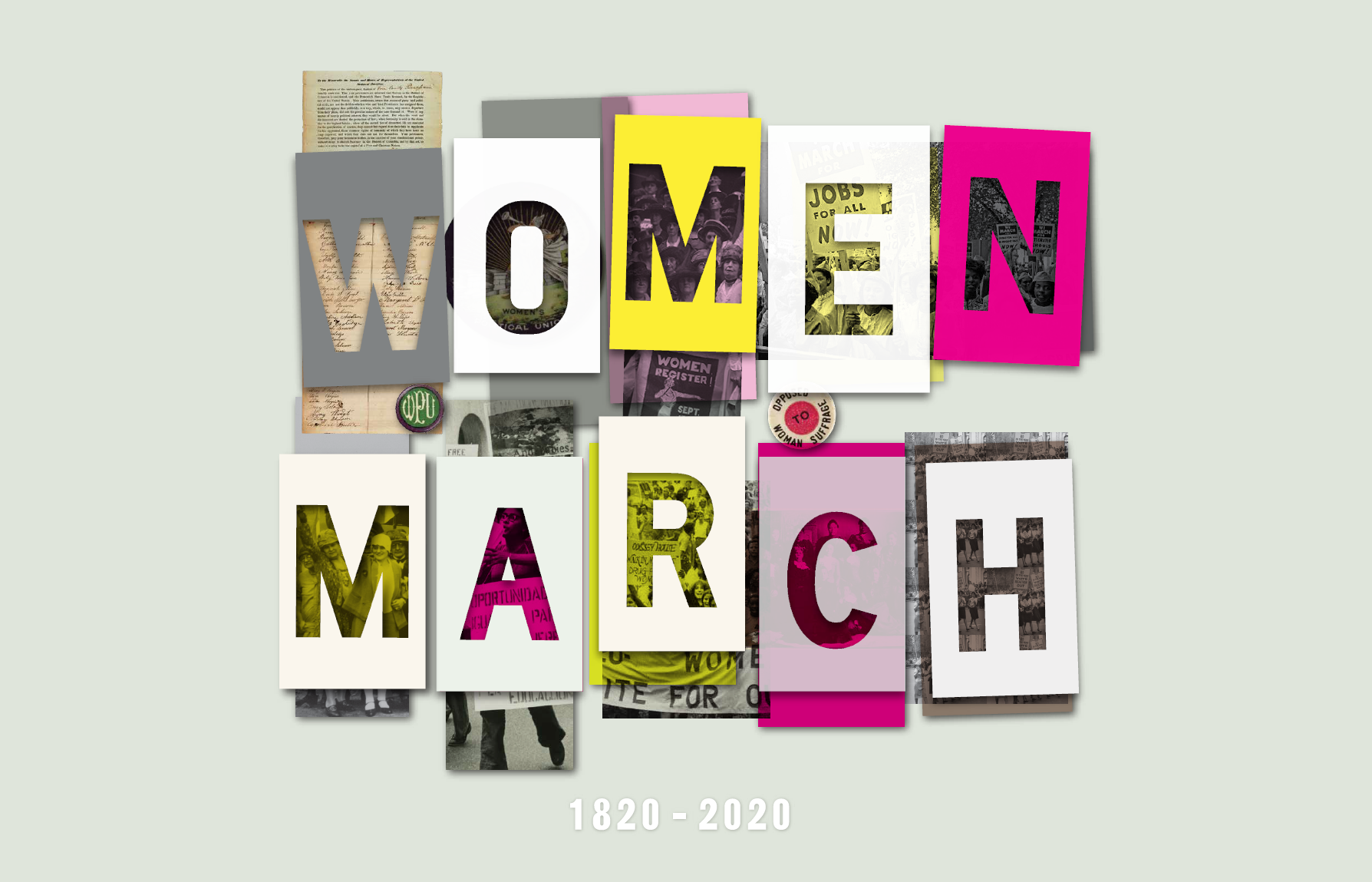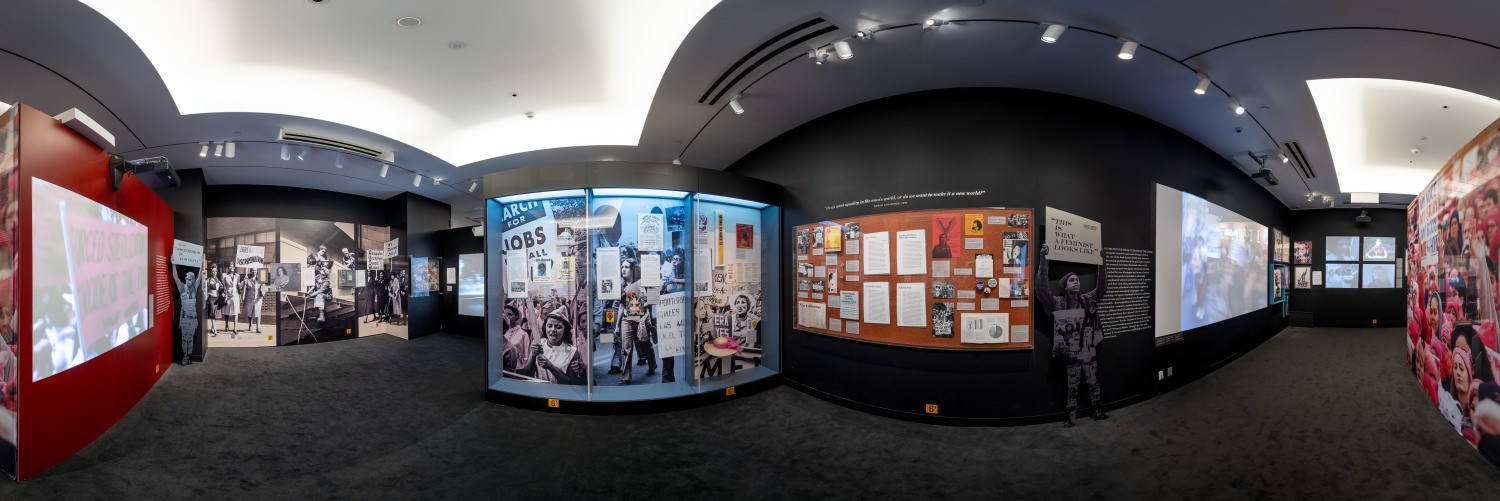
click for 360 tour
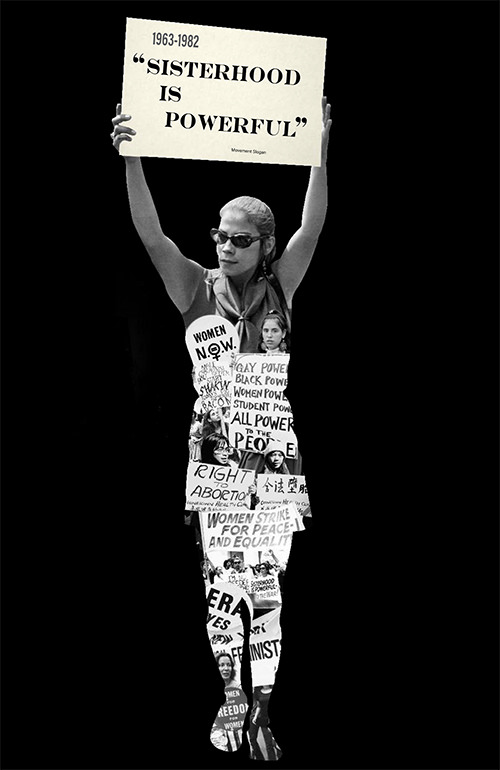
“Sisterhood is Powerful”
–Movement Slogan
In the late 1960s and early 1970s, a mass movement for women’s liberation exploded into national consciousness. Although rooted in earlier feminist thinking and advocacy, it was propelled by new calls for racial and economic justice and sexual liberation that awakened women to the boundaries of their citizenship. A diverse array of women engaged in evolving justice actions, as the Civil Rights movement spawned Black Power, opposition to the Vietnam War intensified—especially among college students—and activists interrogated the links between racism, capitalism, imperialism, and war. In response to the gendered division of labor and their sidelined contributions in these movements, women organized independently as women. Their differences were both a strength and a source of tension. Associations such as the National Organization for Women, grass-roots “consciousness raising” discussions, and radical alliances used a vast arsenal of tactics to change women’s lives across myriad interrelated issues at the local, national, and global levels. Soon, “feminism” would become a household word.
Strike for Women’s Equality, New York, 1970
Demonstration against Forced Sterilization, ca. 1970
Women of the Young Lords, New York, ca. 1970
Mary Dore’s 2014 documentary She’s Beautiful When She’s Angry chronicles the complexities of the
Women’s Liberation Movement. These clips demonstrate a few of the many issues faced by feminists in
the 1970s. Music Box Films
Selma to Montgomery March, Alabama, 1965. F.I.L.M. Archive
At the Polls and On the Ticket
For African American women living in the US South, the promise of the 19th Amendment was fulfilled almost a half-century after its ratification. Incidents of racial brutality along with renewed civil rights activity, such as the Mississippi Freedom Summer voter registration campaign, helped bring national attention to widespread voter discrimination and violence occurring in the South. The 1965 Voting Rights Act, which was specifically named an “act to enforce the Fifteenth Amendment of the Constitution,” outlawed poll taxes, prohibited literacy tests, and allowed Southern Black women, with federal assistance, to freely participate in the voting process. Across the country, women harnessed the skills they had honed in civil rights and women’s organizations to run for office. Fannie Lou Hamer, a leader in the Mississippi Freedom Democratic Party, made bids for seats in the statehouse and Congress, while her colleague Unita Blackwell became the first black woman mayor in the state. Patsy Takemoto Mink, an attorney and political activist from Hawaii, and Shirley Chisholm, a Brooklyn educator and NOW co-founder, had historic campaign victories for seats in Congress. Chisholm also sought the US presidency.
Bob Adelman
Young African American women at the March on Washington,
1963
©Bob Adelman Estate
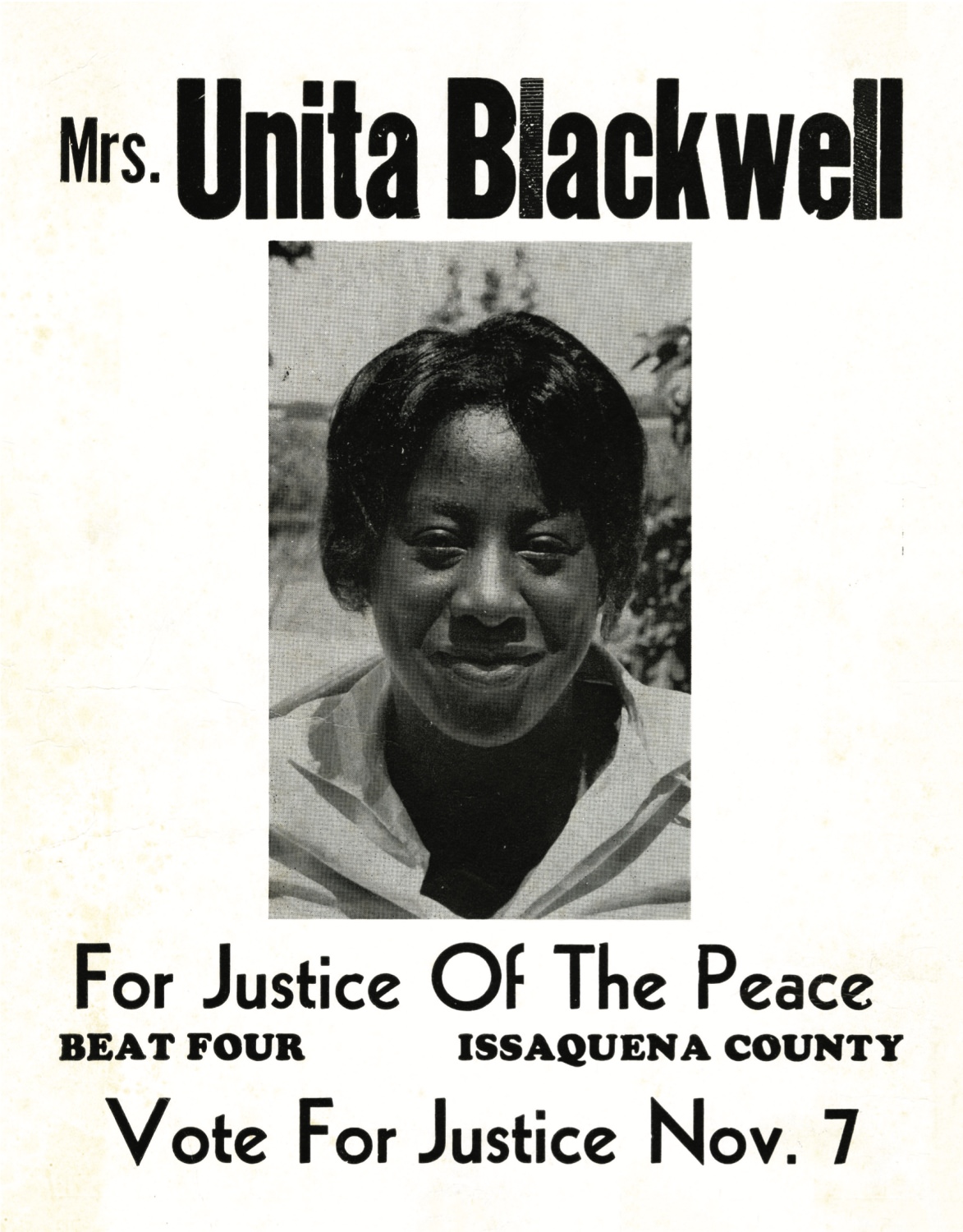
Mrs.
Unita Blackwell for Justice of the Peace campaign poster, 1971
Collection
of the Mississippi Department of Archives and History
In 1976, Unita Blackwell became the mayor of
Mayerville, Mississippi, in a county where no Black person registered to vote
prior to the civil rights movement. Her ascension to politics emerged from her
leadership in the Student Nonviolent Coordinating Committee. She won a
MacArthur Genius Award in 1992 for her work in civil rights and rural community
organizing.
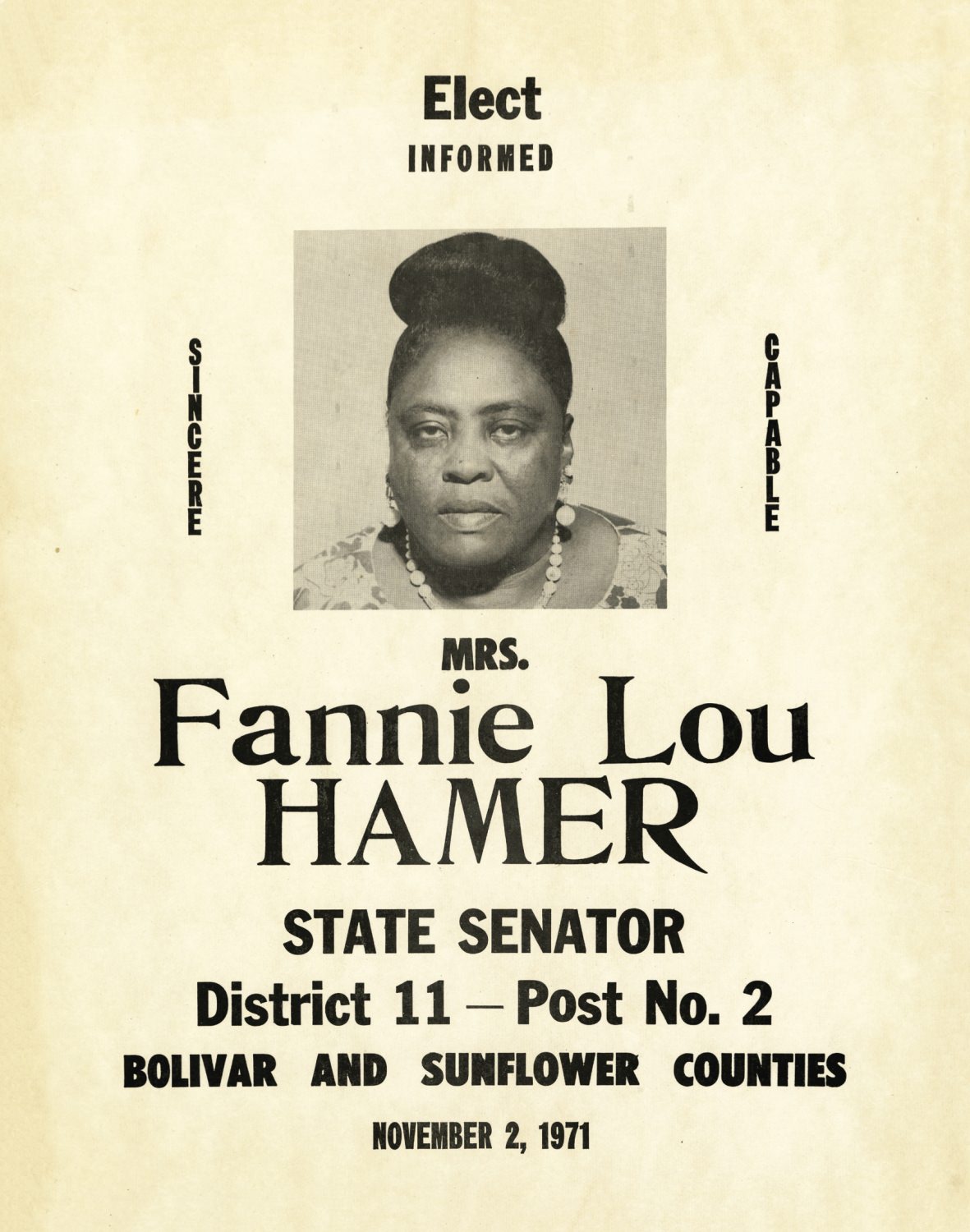
Elect
Mrs. Fannie Lou Hamer, District 11 State Senate campaign
poster,1971
Collection
of the Mississippi Department of Archives and History
Fannie
Lou Hamer was a sharecropper in Ruleville, Mississippi, who joined the civil
rights movement in 1962 as a field secretary for the Student Nonviolent
Coordinating Committee. After her unsuccessful Congressional run in 1964, Hamer
continued her organizing work with the Mississippi Freedom Democratic Party,
the Freedom Farm Cooperative, and Head Start.
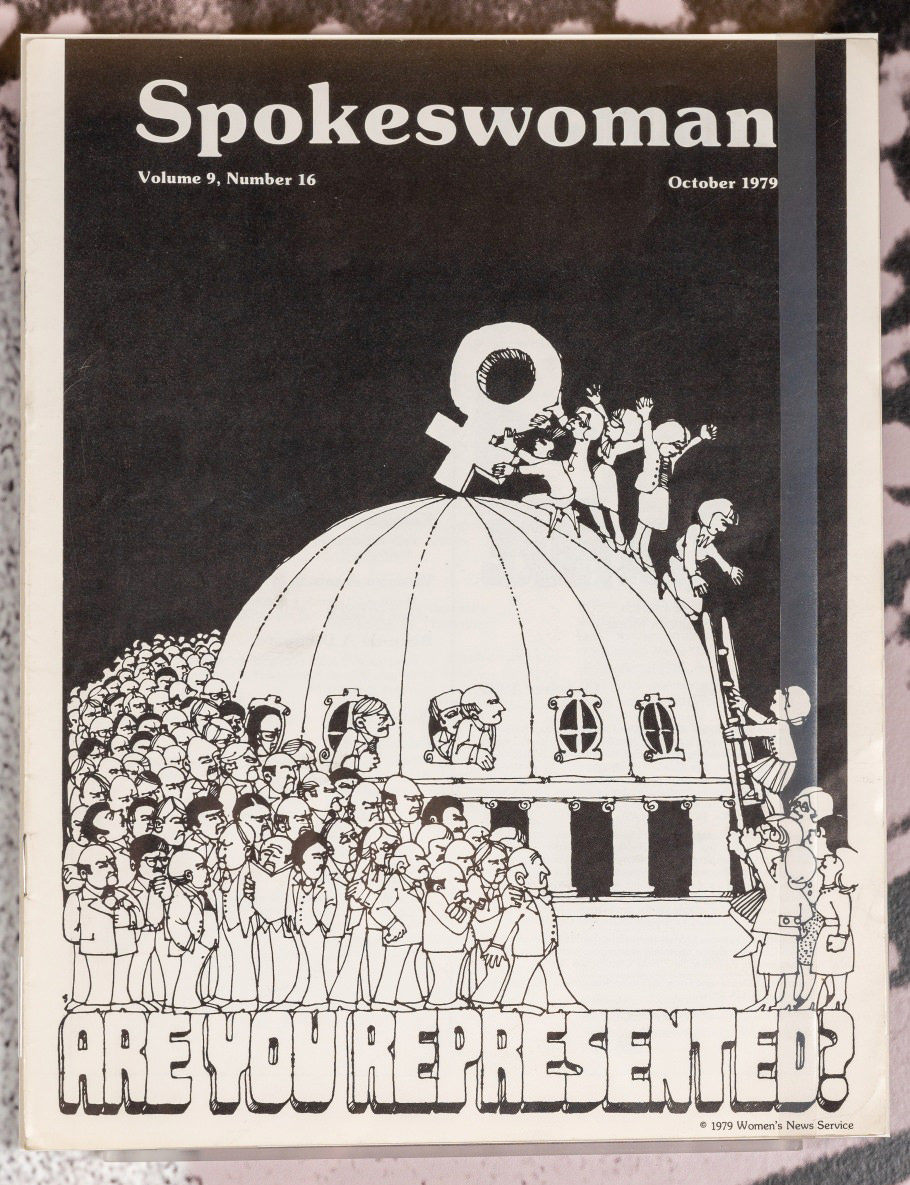
Spokeswoman magazine, October
1979
New-York
Historical Society, Courtesy of Alice Kessler-Harris
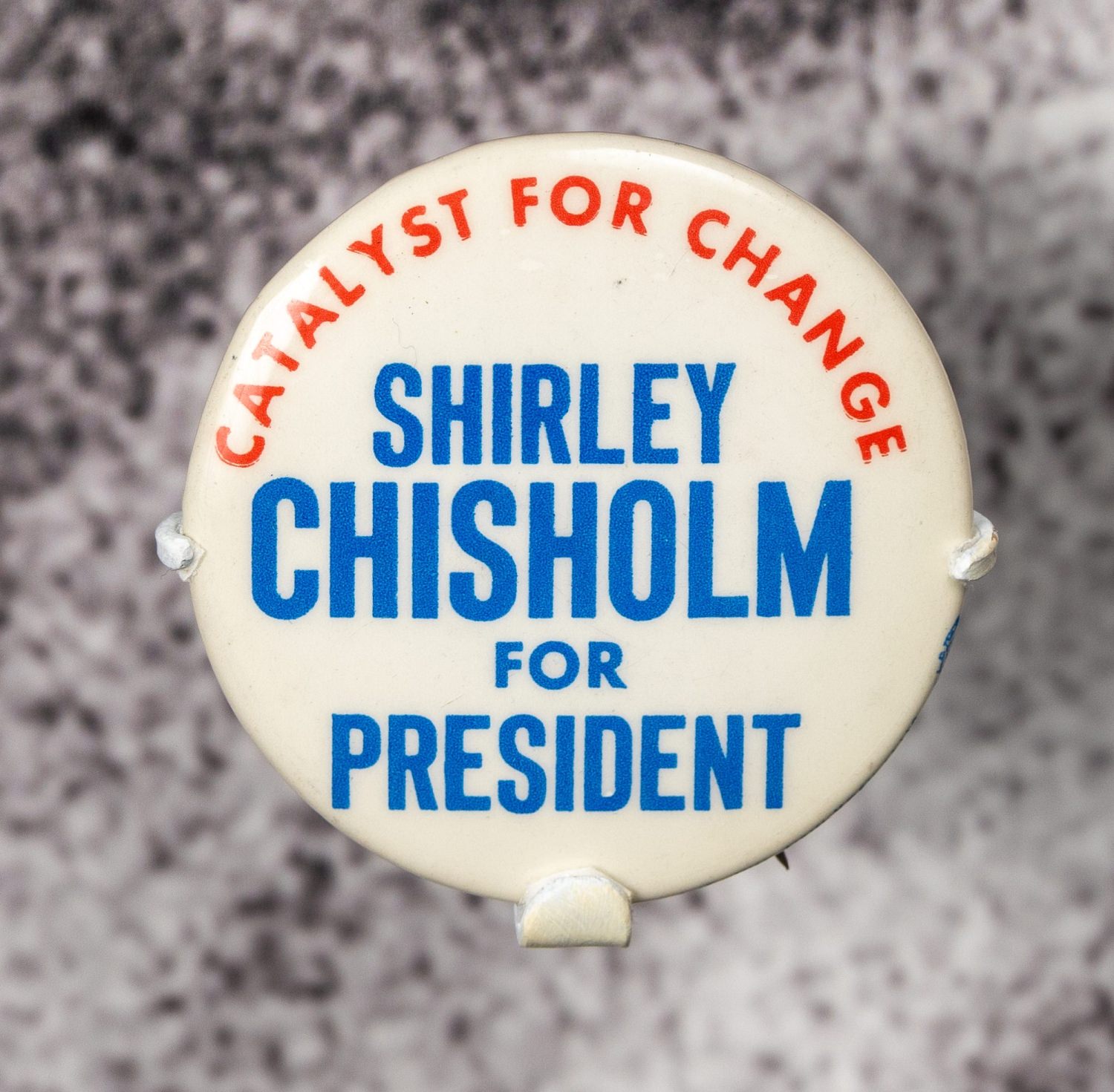
Shirley
Chisholm for President pin-back button,1972
Metal
Gift
of Patricia Falk, 2002.30.7
“The Personal is
Political”
–Movement
Slogan
The women’s liberation movement was fueled by the simultaneous civil rights and anti-war protest campaigns, as well as legal and legislative innovations that made sex discrimination actionable. Participants also turned to consciousness-raising as a new strategy for political change. In sharing their experiences, many women realized for the first time that their individual struggles were influenced by institutional, systemic, and political forces. They labelled the confluence of these forces “patriarchy” to indicate the male-dominated society that excluded women from political and social power. Books like Betty Friedan’s The Feminine Mystique (1963) and Kate Millett’s Sexual Politics (1970) climbed the bestseller lists. A network of publications, notably Ms. magazine, helped bring feminist ideas before a wide audience. Personal analyses and testimonies—from letters to the editor to published autobiographies—helped women transform individual feelings of shame, isolation, and discontent into a collective desire for widespread change. It propelled them to the streets in marches like the Women’s Strike for Equality.
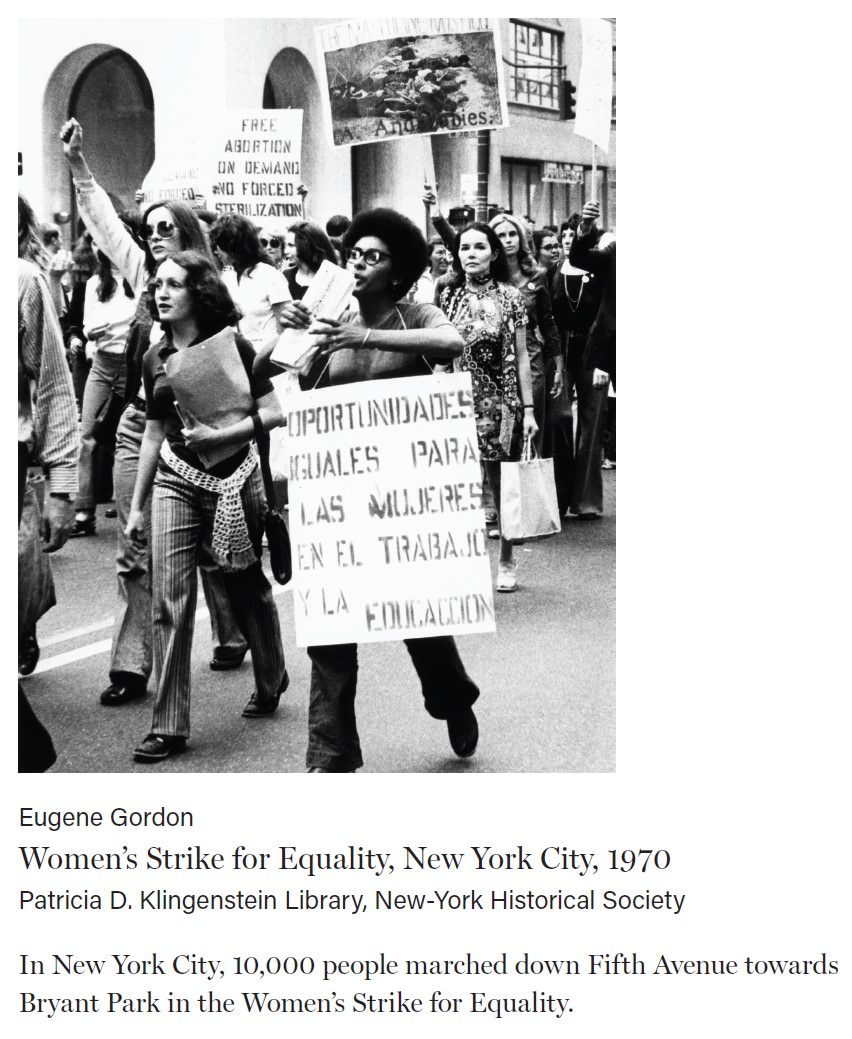
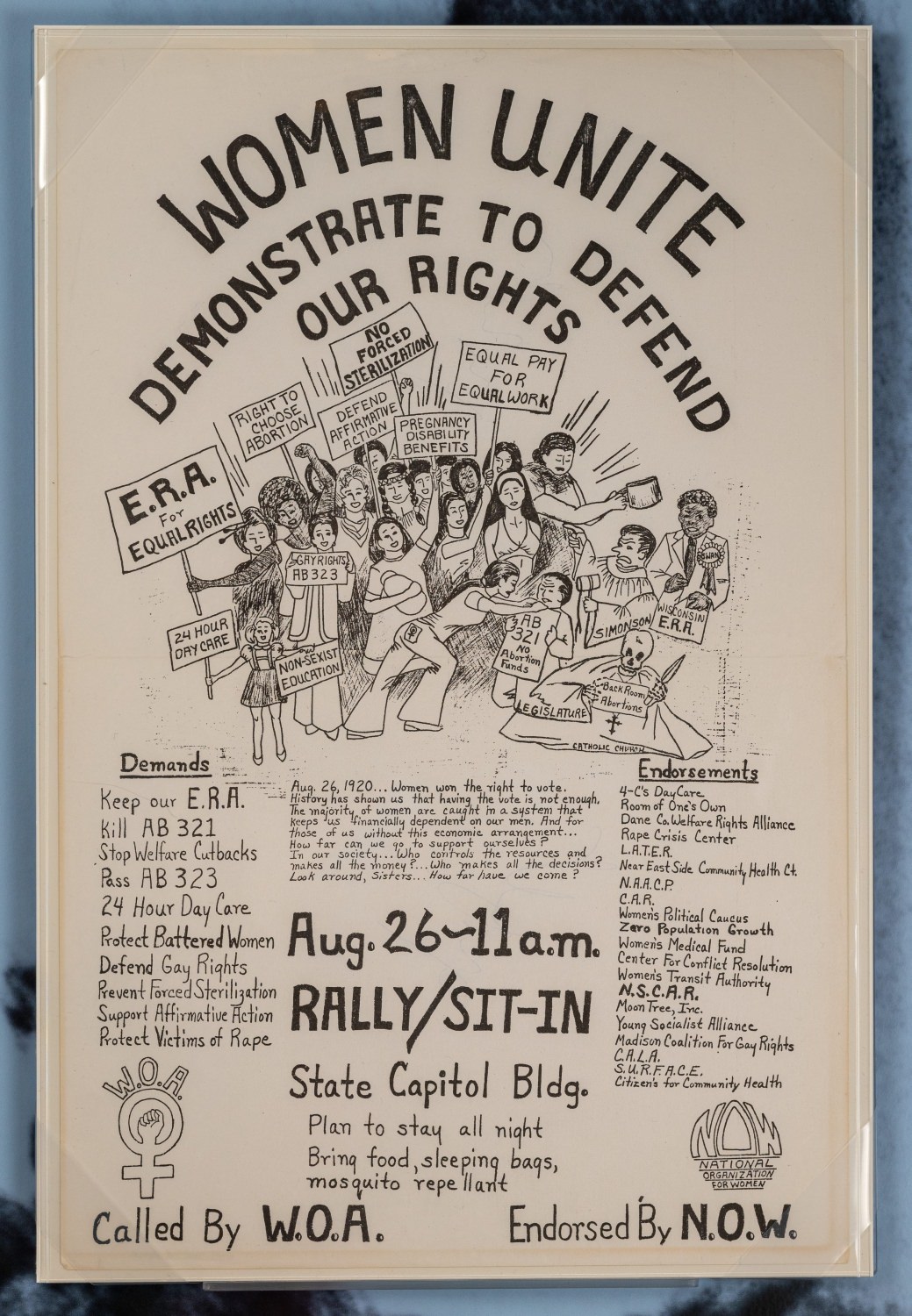
National
Organization for Women
Women
Unite, Demonstrate to Defend Our Rights, 1970
The
Dobkin Family Collection of Feminism
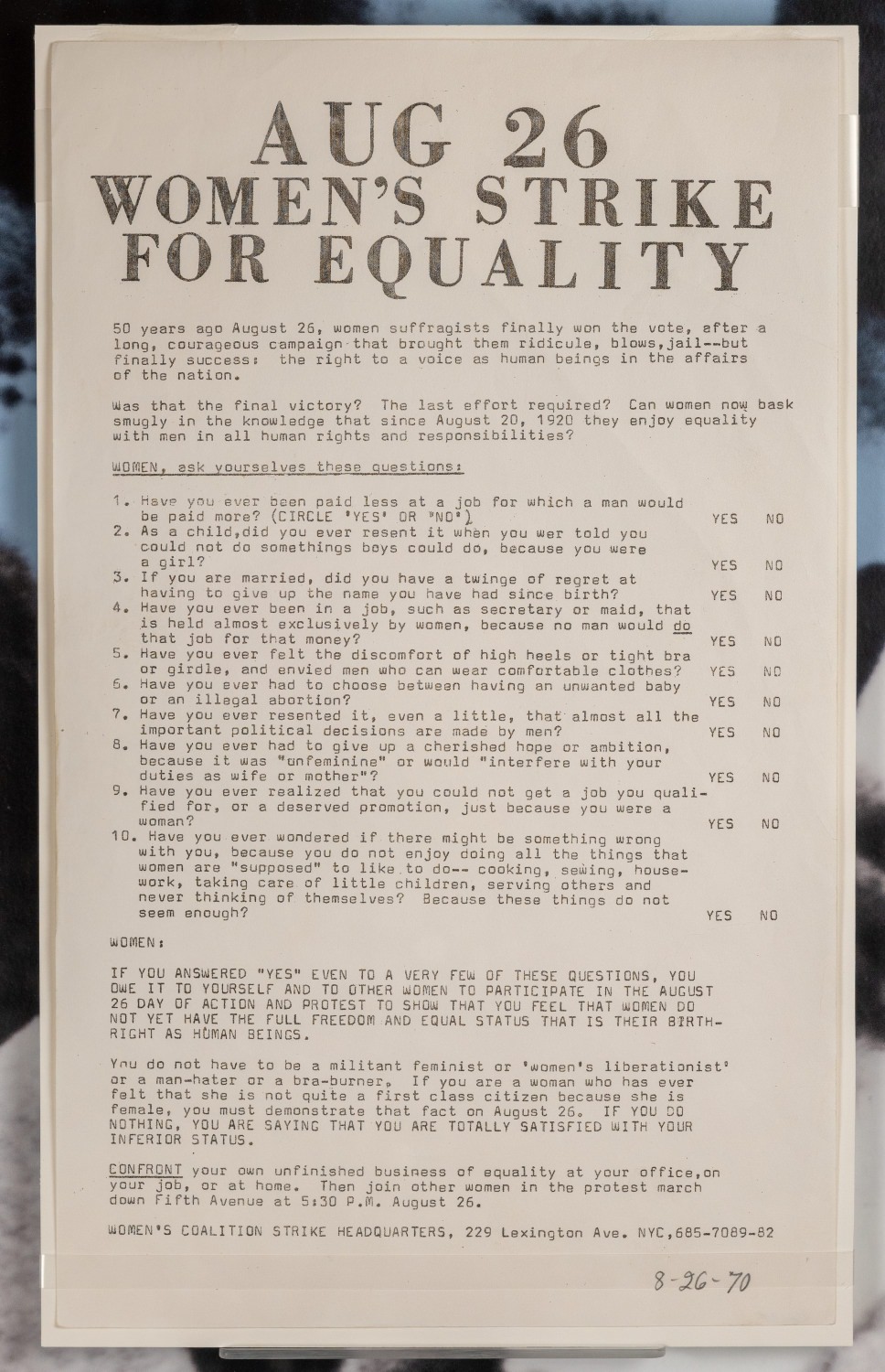
Women’s
Coalition Strike Headquarters
August
26: Women’s Strike for Equality broadside, 1970
Patricia
D. Klingenstein Library, New-York Historical Society
These posters called upon women to participate in
marches that took place across the nation as part of the Women’s Strike for
Equality on August 26, 1970. The strike marked the 50th anniversary of the
passing of the 19th Amendment and issued new demands for women’s equality,
including equal work opportunity, free childcare, and abortion on demand.
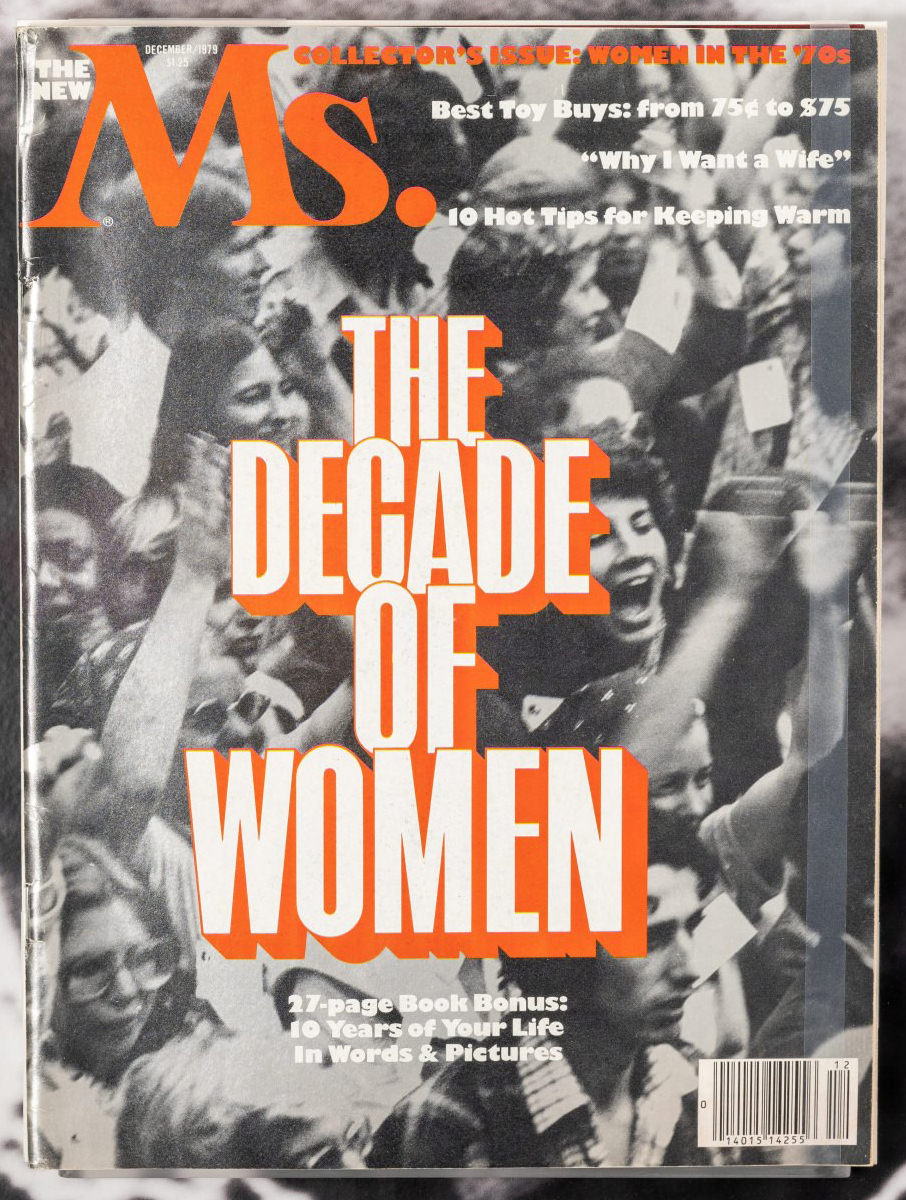
Ms. magazine, December 1979
New-York
Historical Society, Courtesy of Alice Kessler-Harris
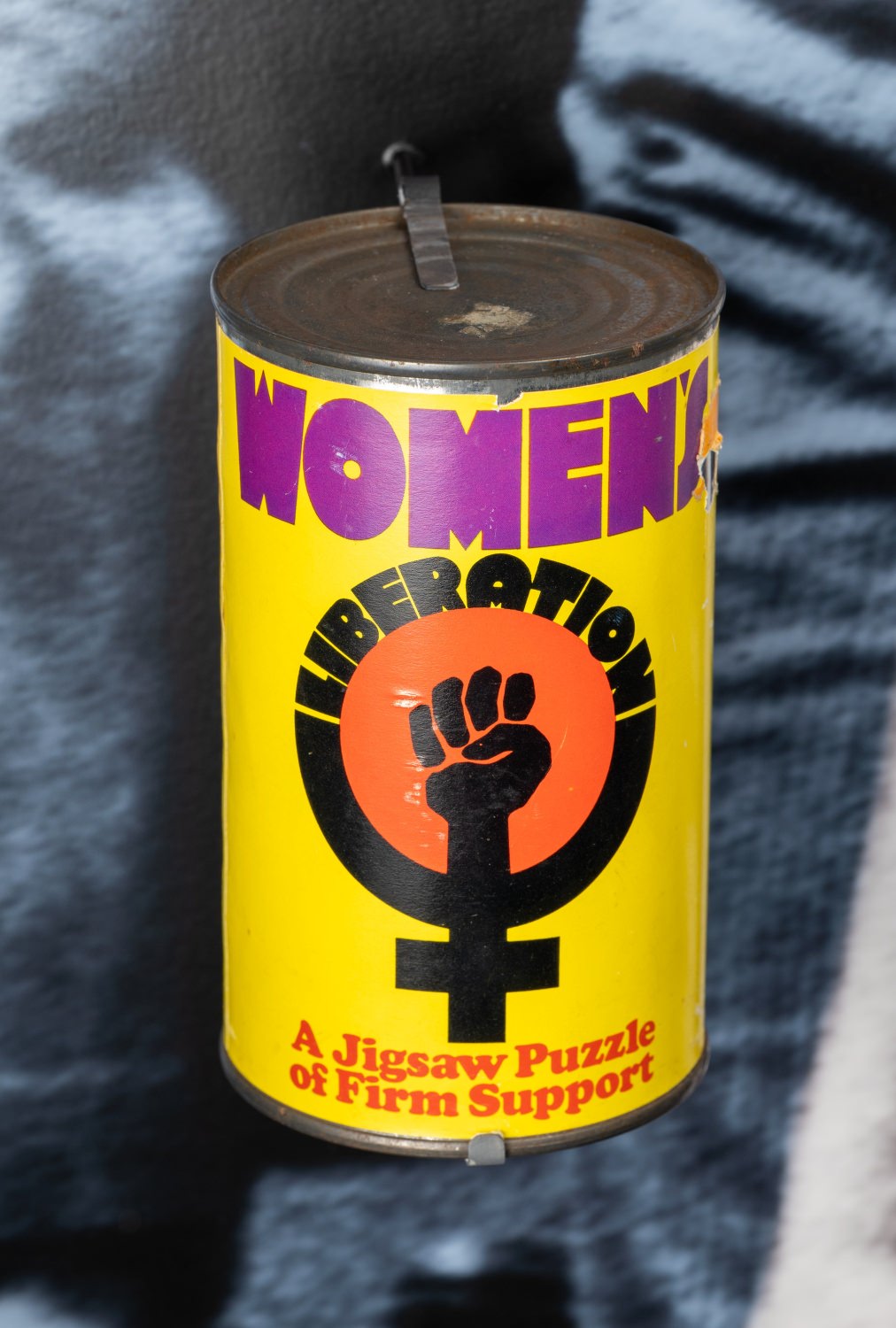
National
Organization for Women
Jigsaw puzzle sold during Women’s Strike
for Equality, August 1970
Metal
and paper
Gift
of Beth M. Eddey, 2014.18.2
Feminist organizations, similarly to their suffrage
predecessors, created items like this jigsaw puzzle bearing the women’s
liberation emblem, and sold them for the dual purposes of fundraising and
spreading their message.
The Equal Rights Amendment
In 1972, five decades after its initial introduction by Alice Paul, Congress passed the Equal Rights Amendment and sent it to the states for ratification. Supporters emphasized it as a vehicle for improving women’s economic conditions. Their efforts—led largely by the National Organization for Women—evoked suffrage pageantry and tactics. Marchers wore white and carried yellow and purple banners, while radicals held vigils outside the White House and conducted hunger strikes. Paul died in 1977, prompting a commemorative march highlighting the prolonged fight for legal equality on the basis of sex. Women were equally instrumental in the opposition campaign. Conservative leader Phyllis Schlafly stoked fears that the ERA would undermine the traditional family and eliminate gender-specific privileges, including child support and male-only draft conscription. Her Eagle Forum, alongside other conservative leaders and groups, mobilized a mass grassroots network to marches, letter-writing campaigns, and conferences. They also protested proposals for public child care, the legalization of abortion, and school integration. In 1982, the ERA fell three states short of the 38 needed for ratification. A major plank of the feminist platform splintered, prompting a reevaluation not only of future activism, but the definition of feminism itself.
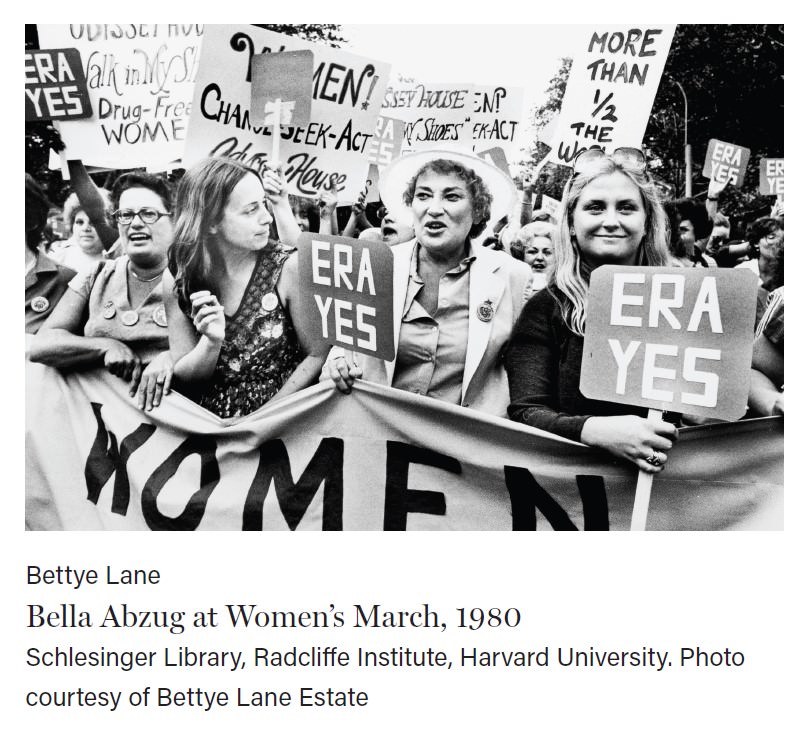
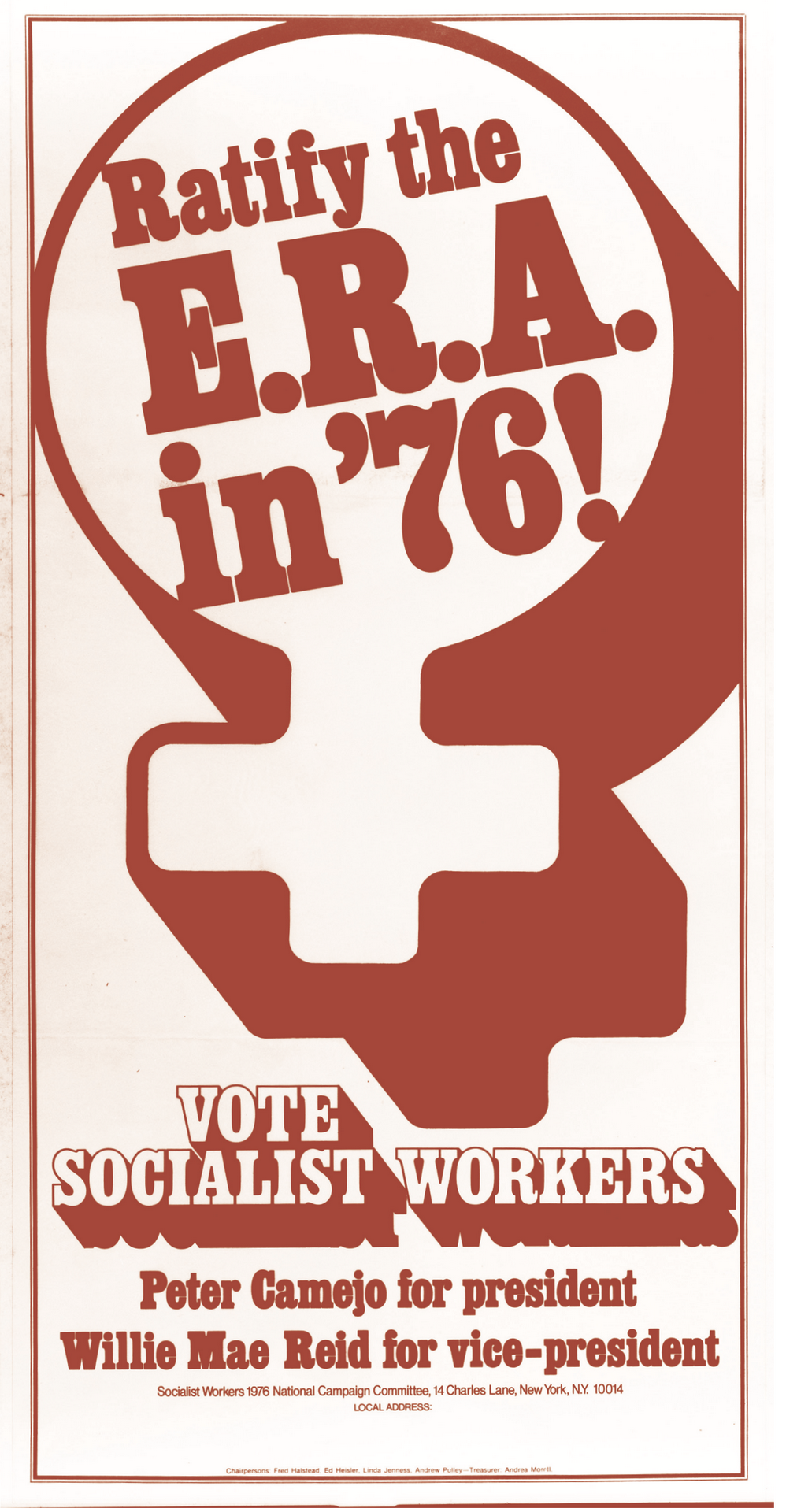
Socialist
Workers Party, National Campaign Committee
Ratify
the E.R.A. in '76. Vote Socialist Workers,
ca. 1976
Library
of Congress, Prints and Photographs Division, Washington, DC
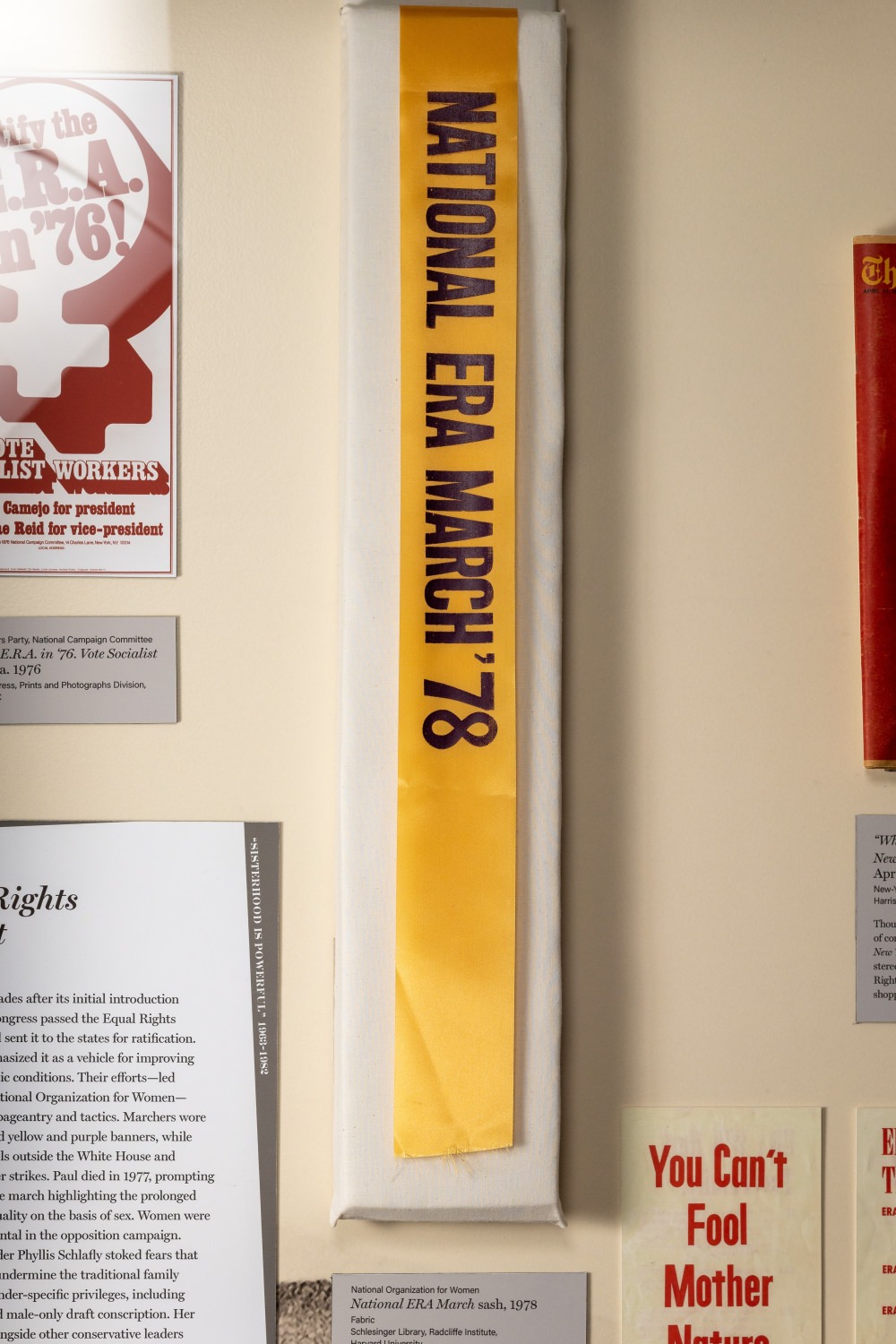
National
Organization for Women
National
ERA March sash, 1978
Fabric
Schlesinger
Library, Radcliffe Institute, Harvard University
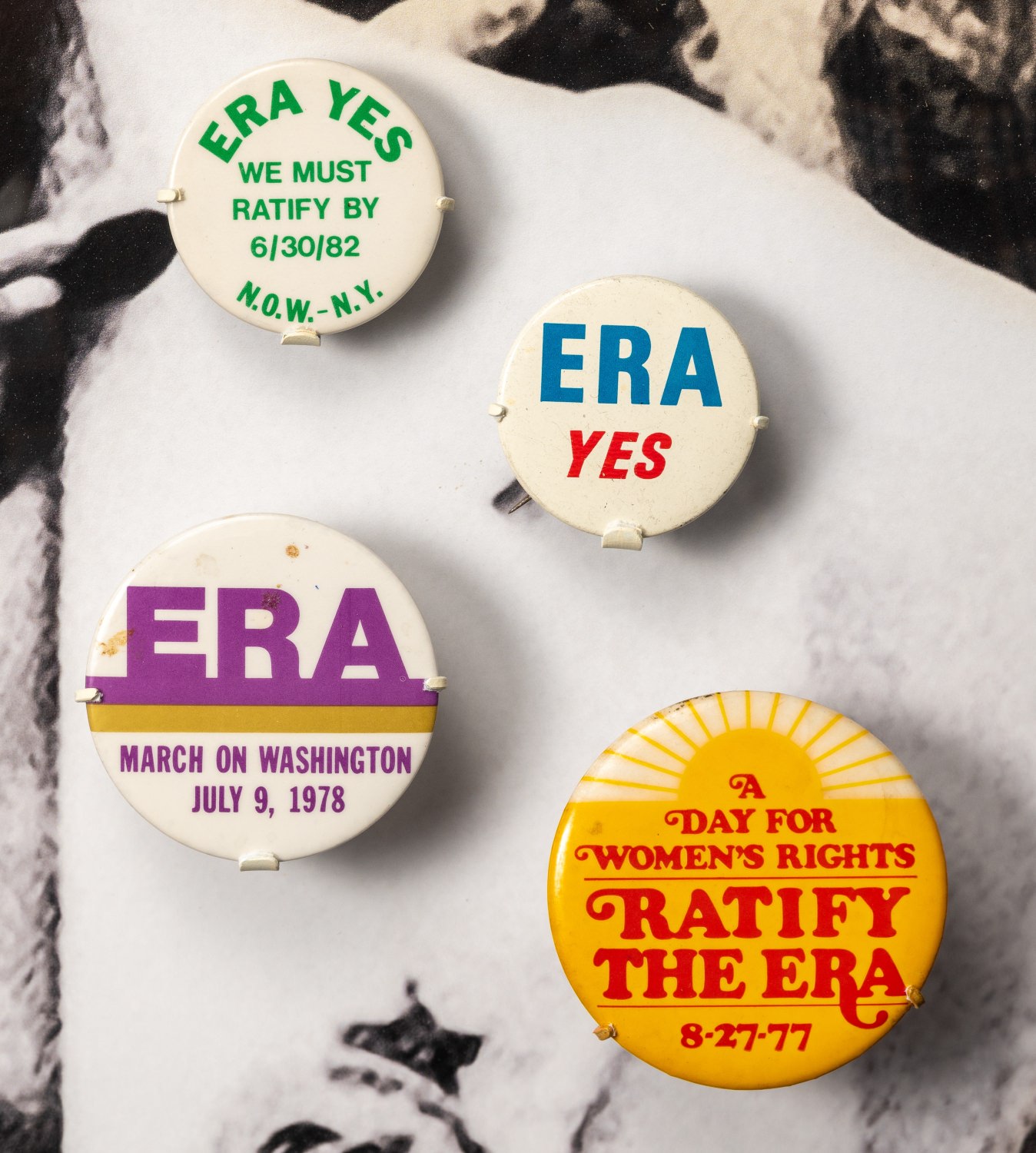
ERA
March on Washington pin-back button,1978
Metal
Gift
of Beatrice J. Siegel, 2002.70.59
Ratify
the ERA pin-back button, 1977
Metal
Gift
of Betty Lerner. 2011.39.60
ERA
YES pin-back button, ca. 1970–75
Metal
Gift
of Norma P. Munn. 2002.68.18
National
Organization for Women, New York
We
Must Ratify by 6/30/82 pin-back button,1982
Metal
Gift
of Norma P. Munn, 2006.5.1
Stop-ERA Campaign
You Can’t Fool Mother Nature,
ca. 1974–77
Courtesy of the Gerald R. Ford Presidential Library
Conservative women mobilized to defeat the Equal
Rights Amendment by arguing that legally mandated equality would force women to
abandon their traditional roles as wives and mothers. They warned that the ERA
would compel women to work outside the home to support their families and
subject them to the military draft.
Hat belonging to Bella Abzug, ca.
1970s
Straw
and pink tulle
Gift
of Judge Emily Jane Goodman, 2018.3
Activist and Congressional representative Bella Abzug
(1920-1998) began wearing instantly recognizable hats early in her career so
that men would take her seriously rather than mistaking her for a secretary.
“Who’s
afraid of equal rights?”
New York Times Magazine, April 11, 1976
New-York
Historical Society, Courtesy of Alice Kessler-Harris
Though it could easily be mistaken as a portrait of
conservative activist Phyllis Schlafly, this New York Times Magazine cover depicts the stereotypical woman who
opposed the Equal Rights Amendment: a pearl-wearing, grocery-shopping,
middle-class housewife.
Defining Work
Work became a flashpoint for feminist activists in the 1970s. Recognizing economic freedom as integral to full citizenship, many sought to expand opportunities for women to work outside of the home. The 1964 Civil Rights Act prohibited inequalities based on sex and race, while feminists used the Equal Employment Opportunity Commission to successfully challenge barriers to women’s employment. Women also called for public daycare to make caregiving a societal responsibility. As their efforts opened doors and removed discriminatory barriers, the number of working women rose dramatically. Cautioning that a focus on legal equality might primarily benefit white, middle-class women, some sought to expand the very definition of work to include paid and unpaid caregiving and domestic labor. As a result, the welfare rights movement emerged at the intersection of the ongoing Black freedom movement, women’s liberation, and anti-poverty activism, and alongside related campaigns like Wages for Housework, the international grassroots collective. Many participants were single women of color, and they fought against punitive social policies that recognized paid labor over caregiving and tied benefits to increased surveillance. Women like Dorothy Bolden and Dolores Huerta also led movements to improve conditions in domestic and agricultural work.
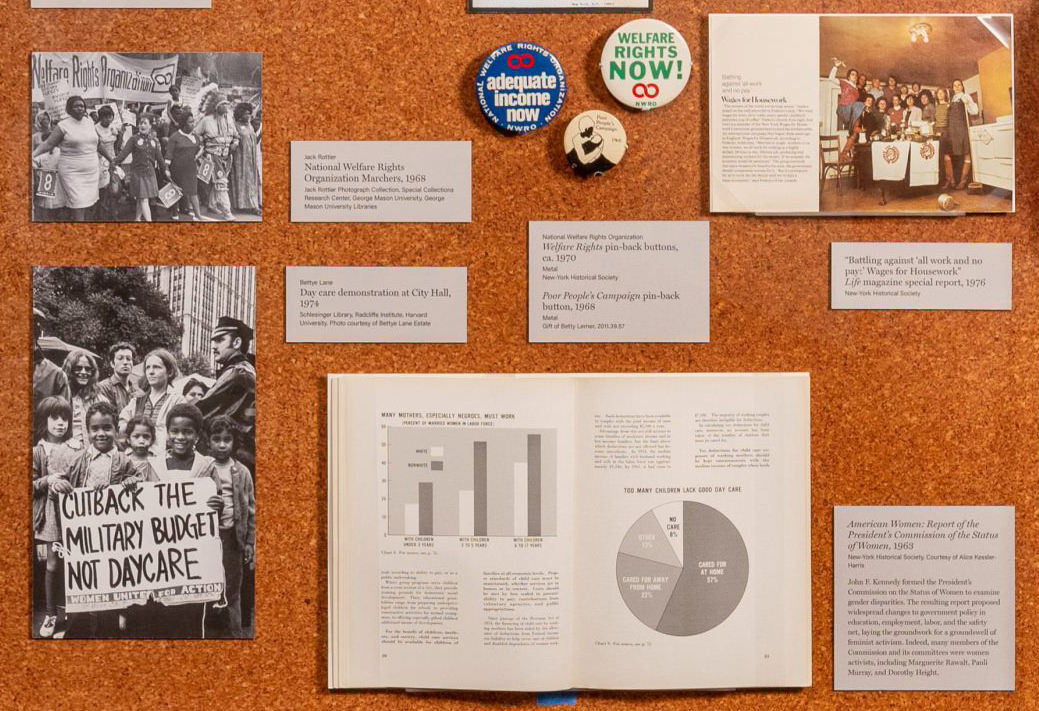
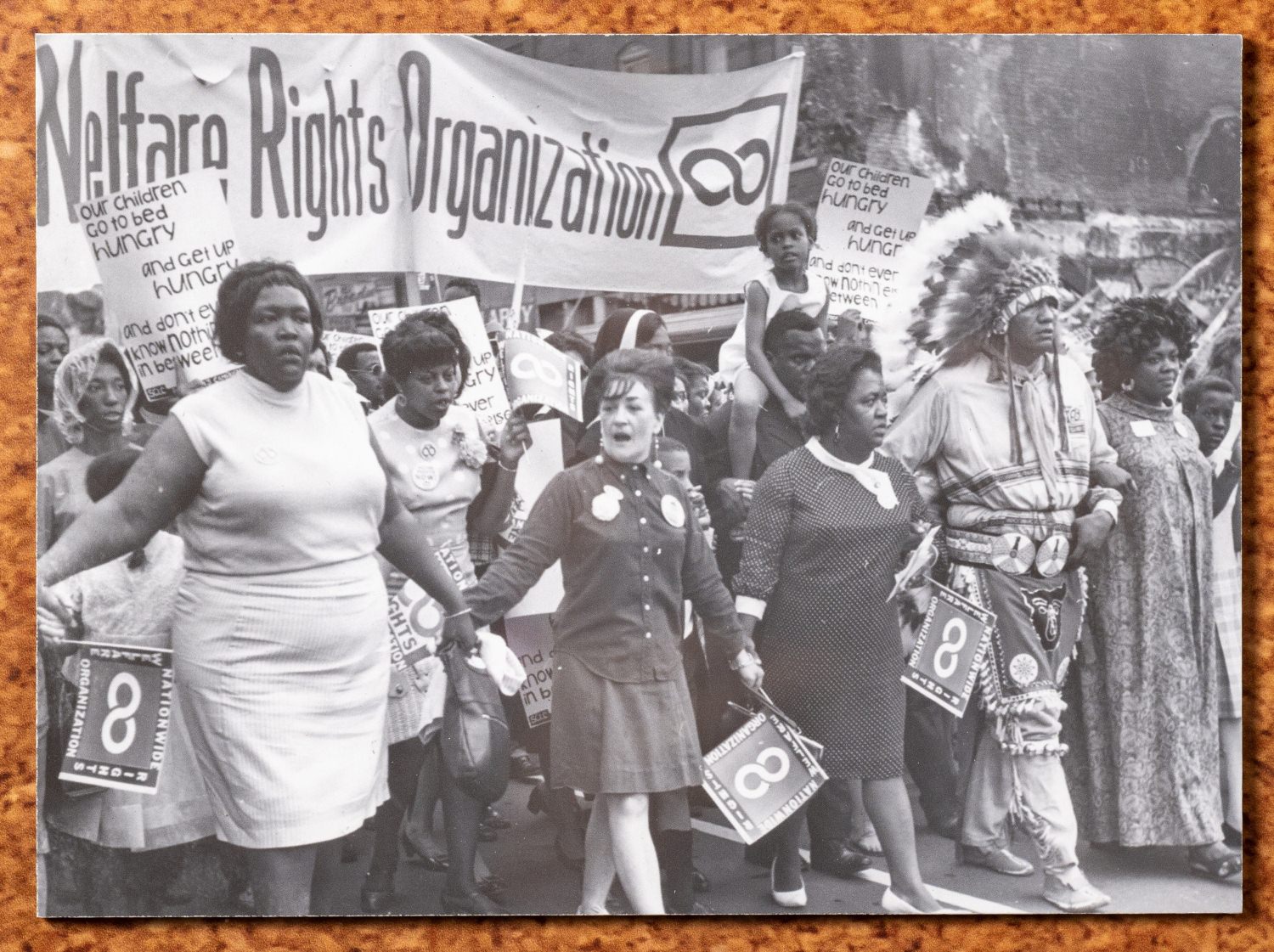
Jack
Rottier
National Welfare Rights Organization
Marchers, 1968
Jack
Rottier Photograph Collection, Special Collections Research Center, George
Mason University,
George Mason University Libraries
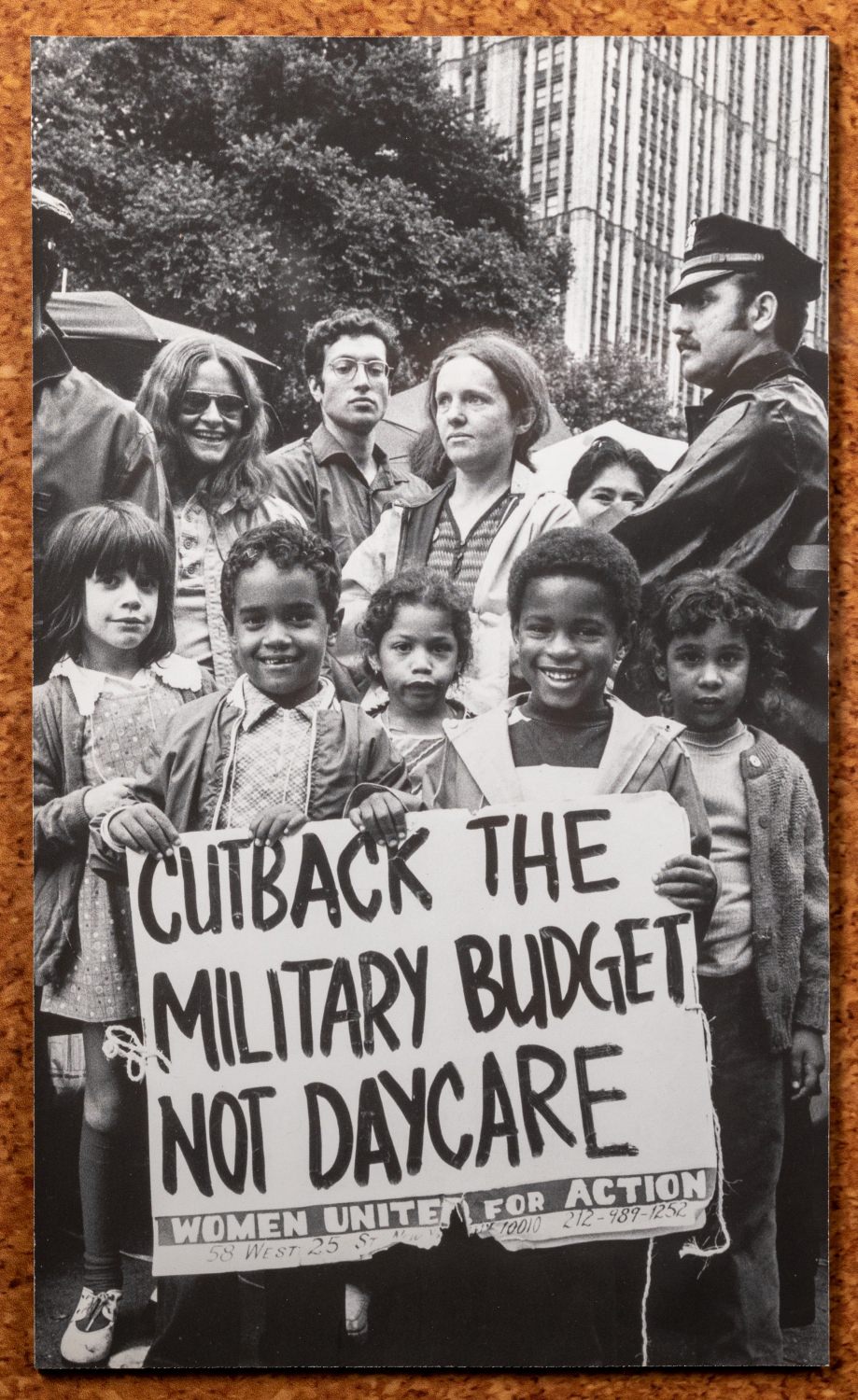
Bettye
Lane
Day care demonstration at City Hall, 1974
Schlesinger
Library, Radcliffe Institute, Harvard University. Photo courtesy of Bettye Lane
Estate
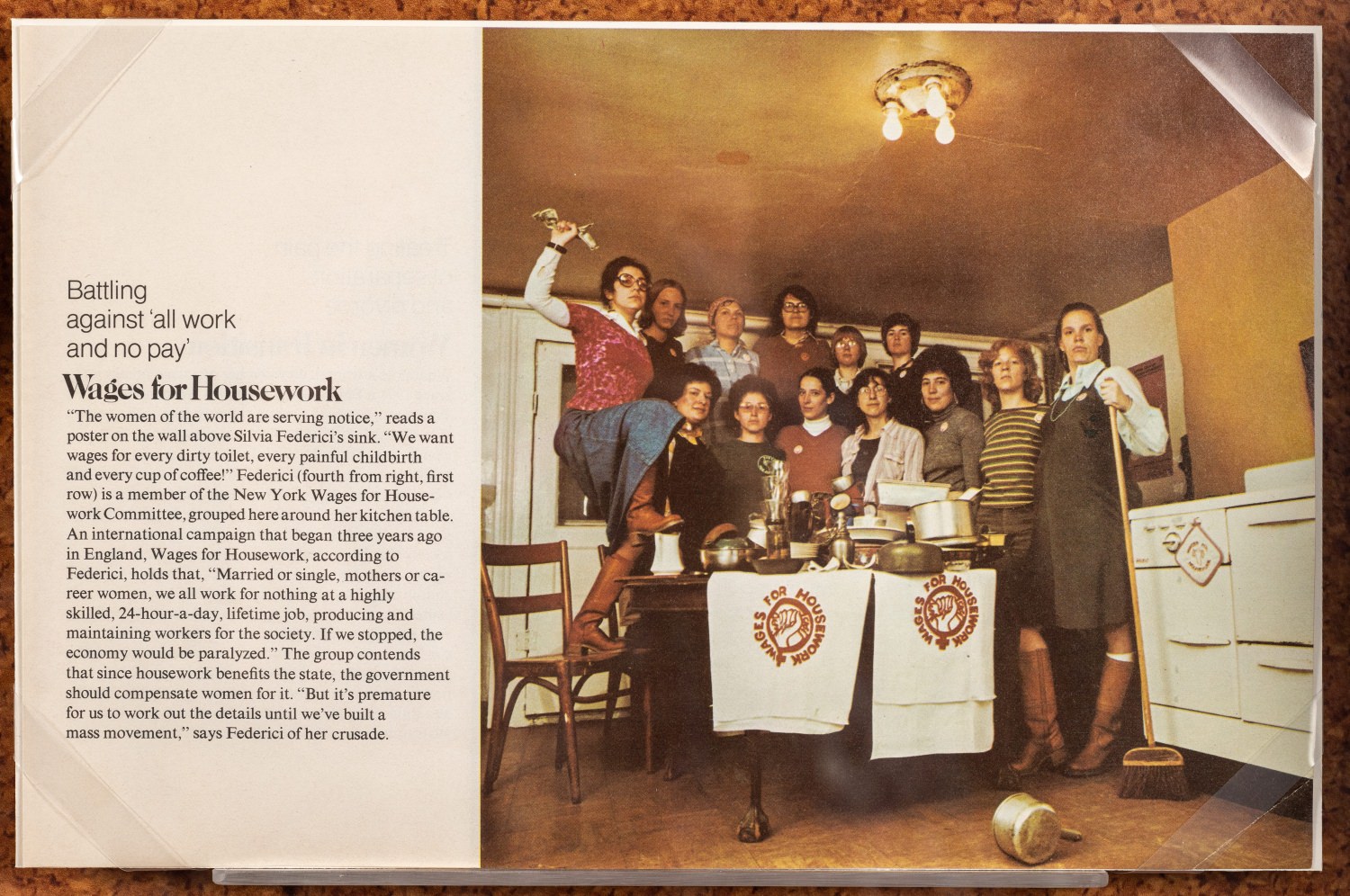
“Battling
against ‘all work and no pay’: Wages for Housework” Life magazine special report, 1976
New-York
Historical Society
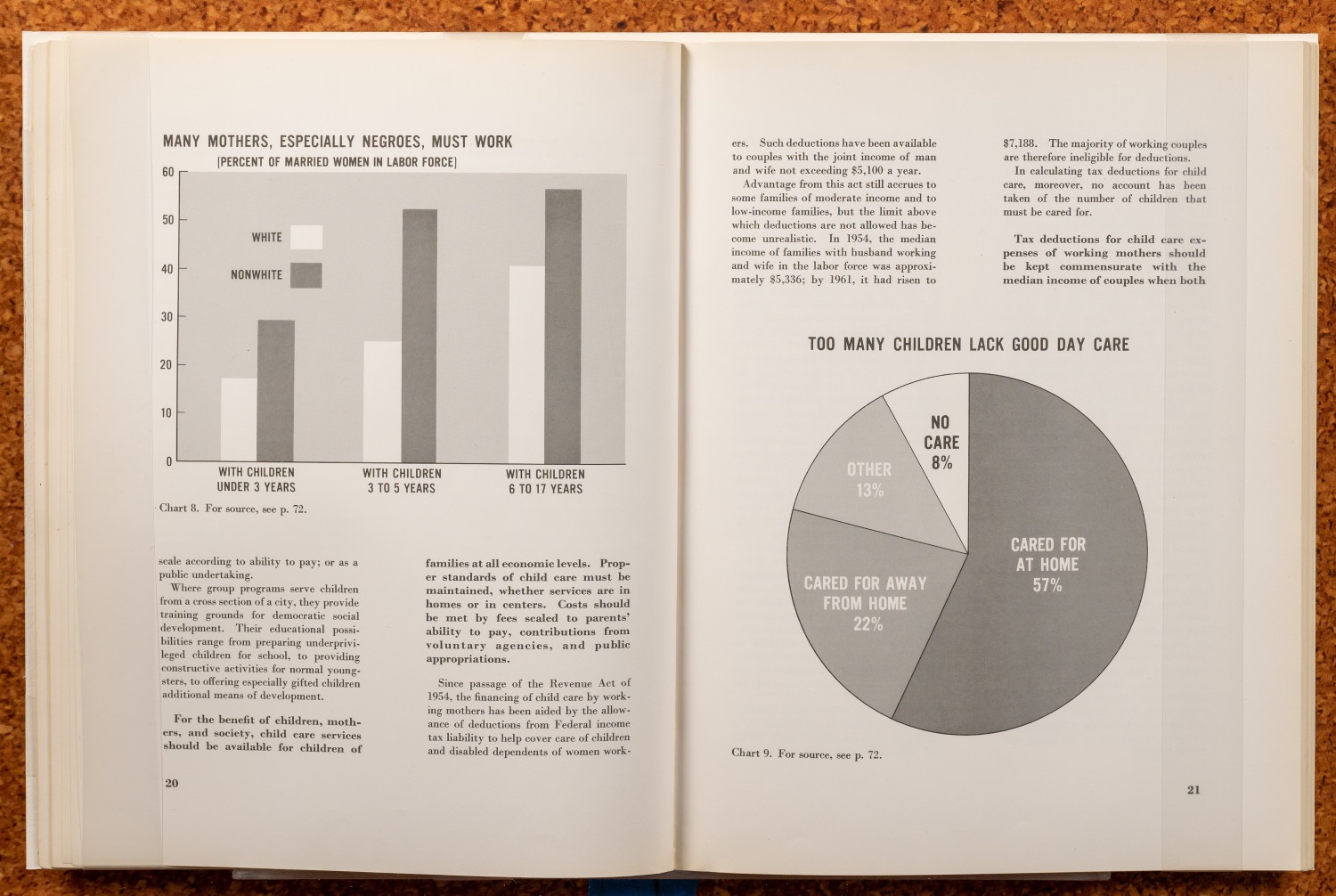
American
Women: Report of the President’s Commission of the Status of Women, 1963
New-York
Historical Society, Courtesy of Alice Kessler-Harris
John F. Kennedy
formed the President’s Commission on the Status of Women to examine gender
disparities. The resulting report proposed widespread changes to government
policy in education, employment, labor, and the safety net, laying the
groundwork for a groundswell of feminist activism. Indeed, many members of the
Commission and its committees were women activists, including Marguerite
Rawalt, Pauli Murray, and Dorothy Height.
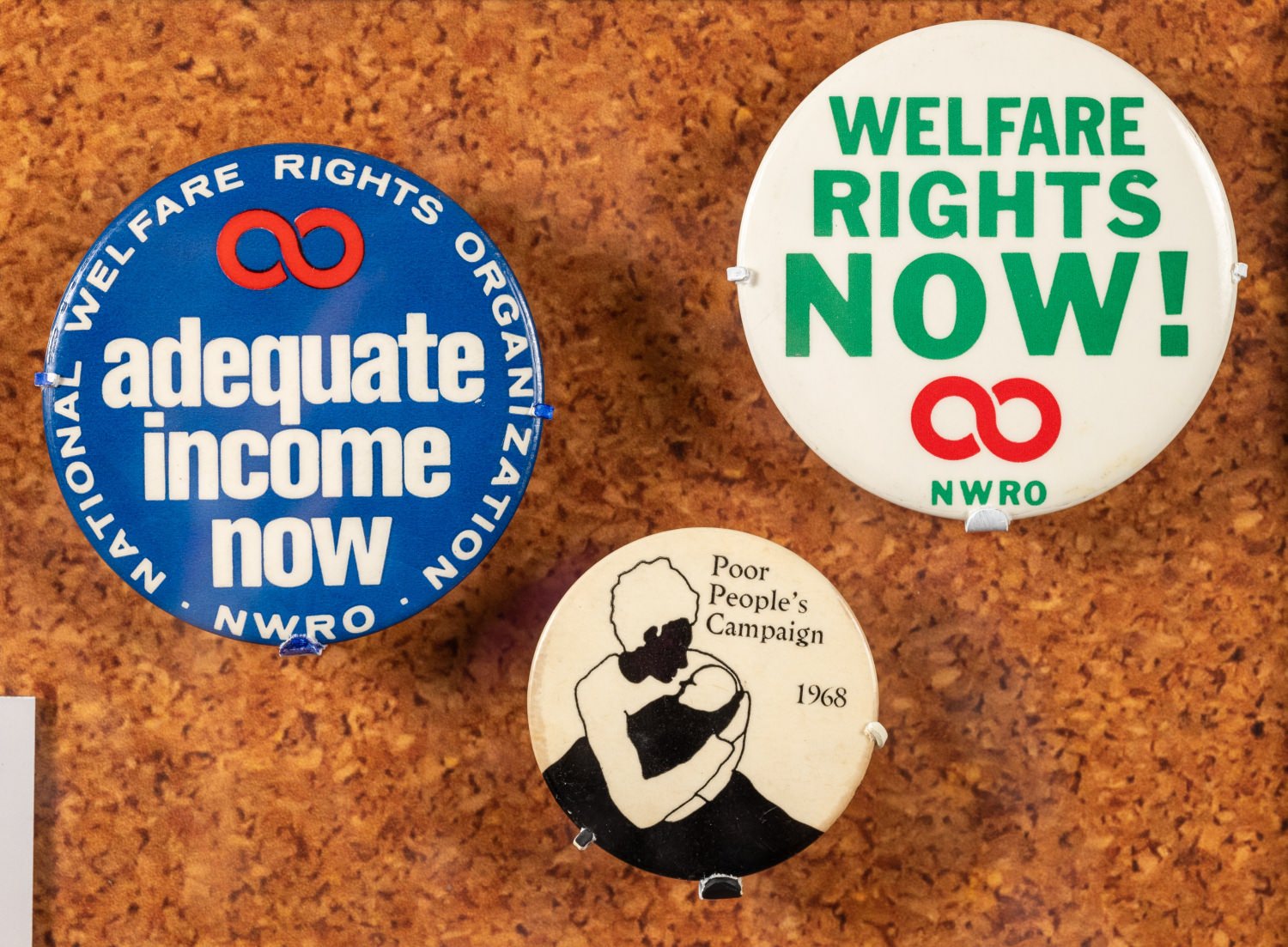
National
Welfare Rights Organization
Welfare
Rights pin-back buttons, ca.
1970-75
Metal
New-York
Historical Society
Poor
People’s Campaign pin-back button, 1968
Metal
Gift
of Betty Lerner, 2011.39.57
Reproductive Rights
With FDA approval of the first oral contraceptive in 1960, questions of control over women’s bodies took on new dimensions. The Pill helped disconnect sexual activity from childbirth and aided the women’s liberation movement’s fight for sexual and reproductive self-determination. Conservative women simultaneously mobilized against feminist gains. Women also demanded their voices be heard in the courtroom. Inspired by a 1969 Redstockings “speak-out,” attorney Florynce Kennedy called dozens of women who had been injured by illegal abortions to testify in a New York State case. This pioneering legal strategy, alongside public protests, drew attention to how restrictive abortion laws oppressed women. In 1973, Kennedy’s techniques were adopted for the landmark Supreme Court case Roe v. Wade, which led to the nationwide legalization of abortion. Black feminists like Congresswoman Shirley Chisholm expanded the discussion to include access to contraceptives and affordable child care, anti-poverty measures, and an end to sterilization abuse, which fell disproportionately on Black, Native American, and Latina women. Until 1977, poverty, single motherhood, incarceration, and the receipt of welfare or Medicaid benefits would remain legal grounds for sterilization.
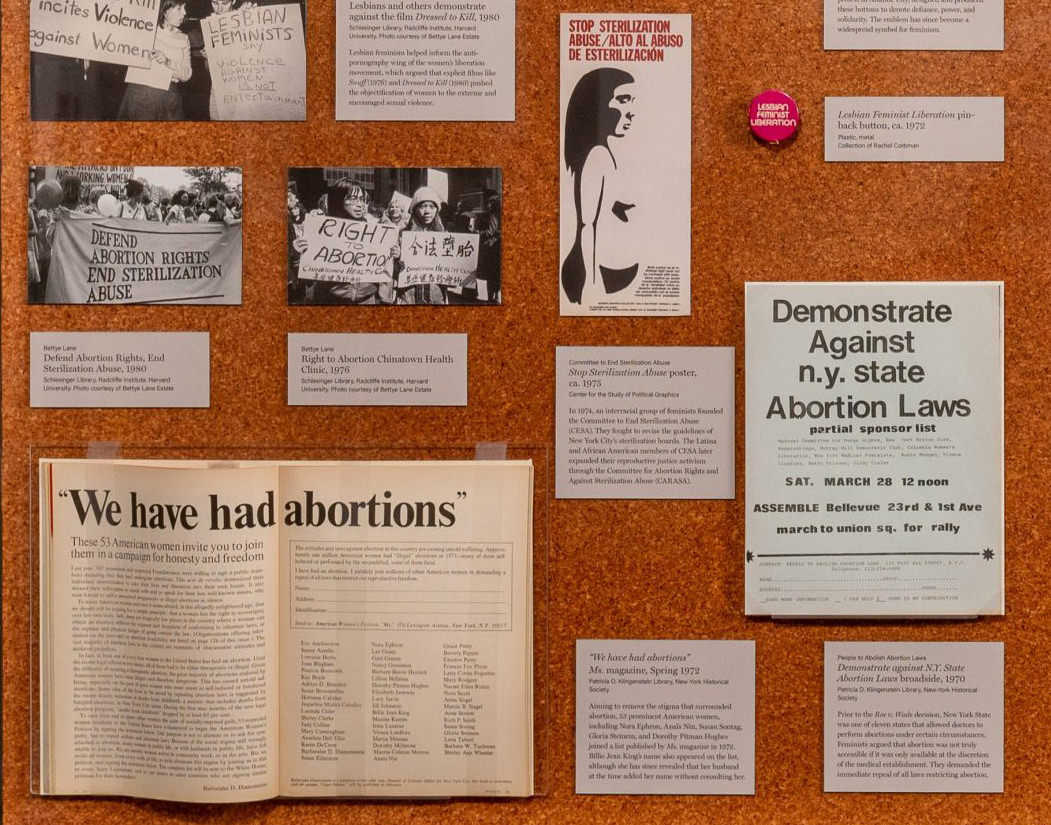
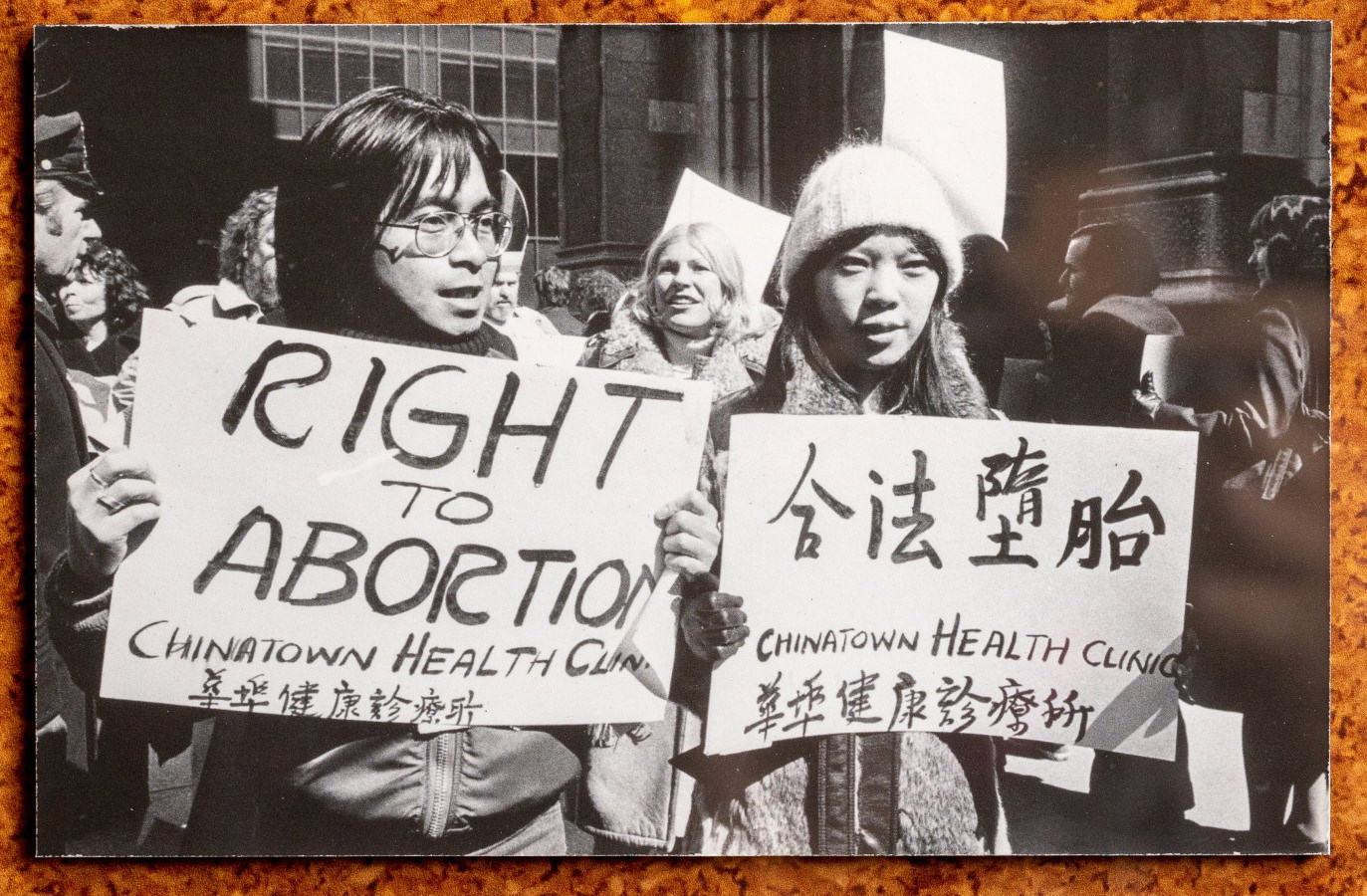
Bettye
Lane
Right to Abortion Chinatown Health
Clinic, 1976
Schlesinger
Library, Radcliffe Institute, Harvard University.
Photo courtesy of Bettye Lane
Estate
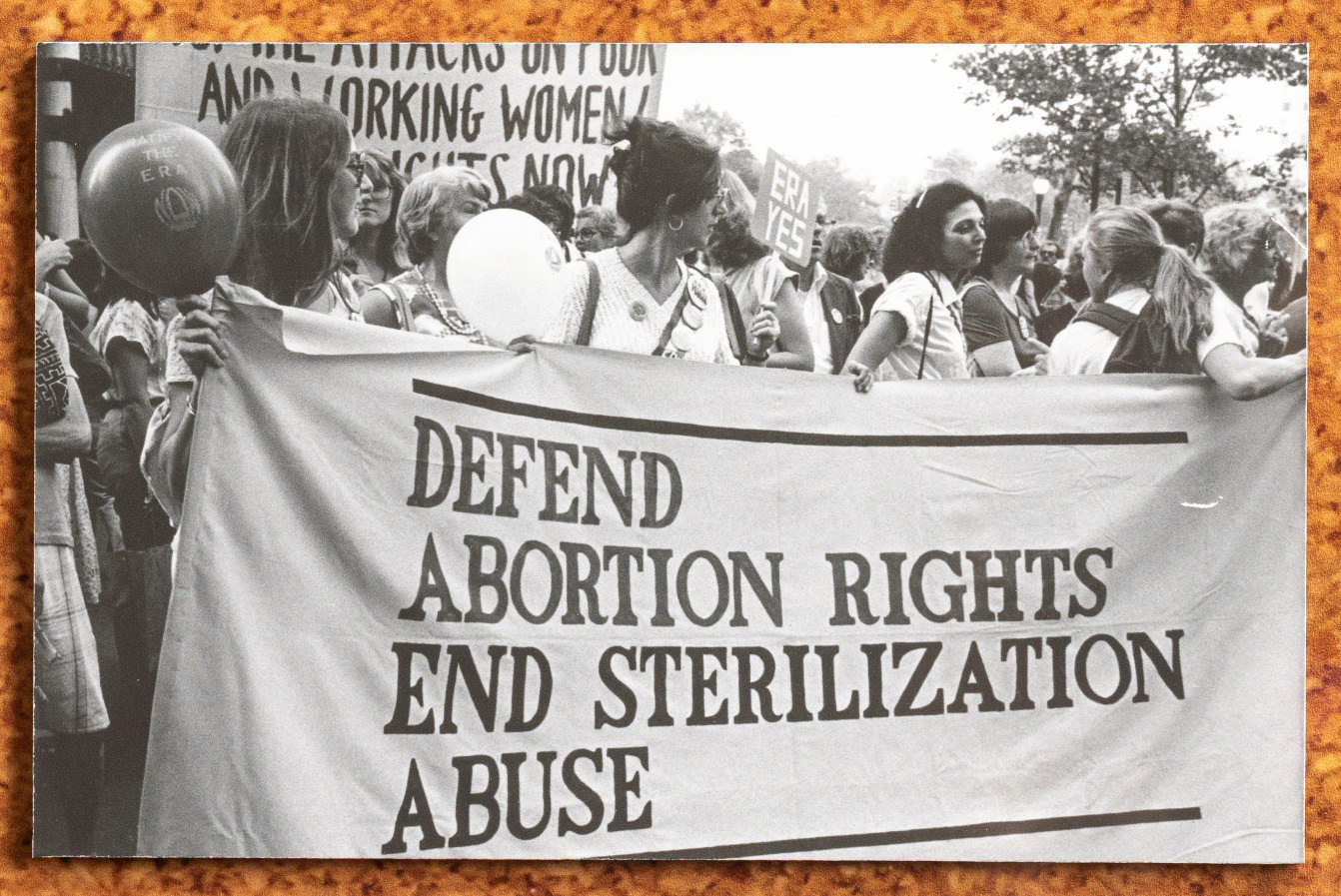
Bettye
Lane
Defend Abortion Rights, End
Sterilization Abuse, 1980
Schlesinger
Library, Radcliffe Institute, Harvard University.
Photo courtesy of Bettye Lane
Estate
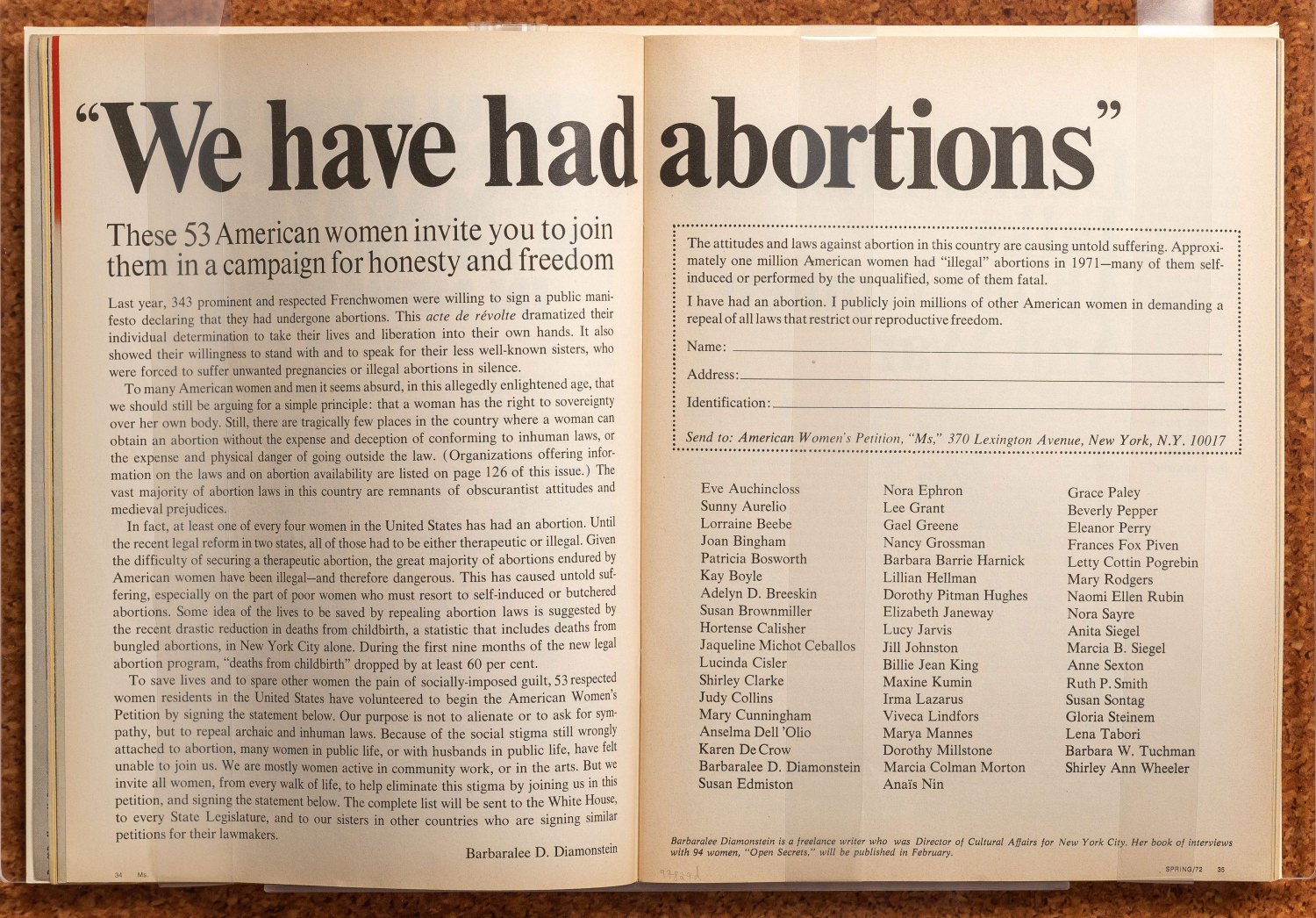
“We
have had abortions”
Ms. magazine, Spring 1972
Patricia
D. Klingenstein Library, New-York Historical Society
Aiming to remove the stigma that surrounded abortion,
53 prominent American women, including Nora Ephron, Anaïs Nin, Susan Sontag,
Gloria Steinem, and Dorothy Pitman Hughes joined a list published by Ms. magazine in 1972. Billie Jean King’s
name also appeared on the list, although she has since revealed that her
husband at the time added her name without consulting her.
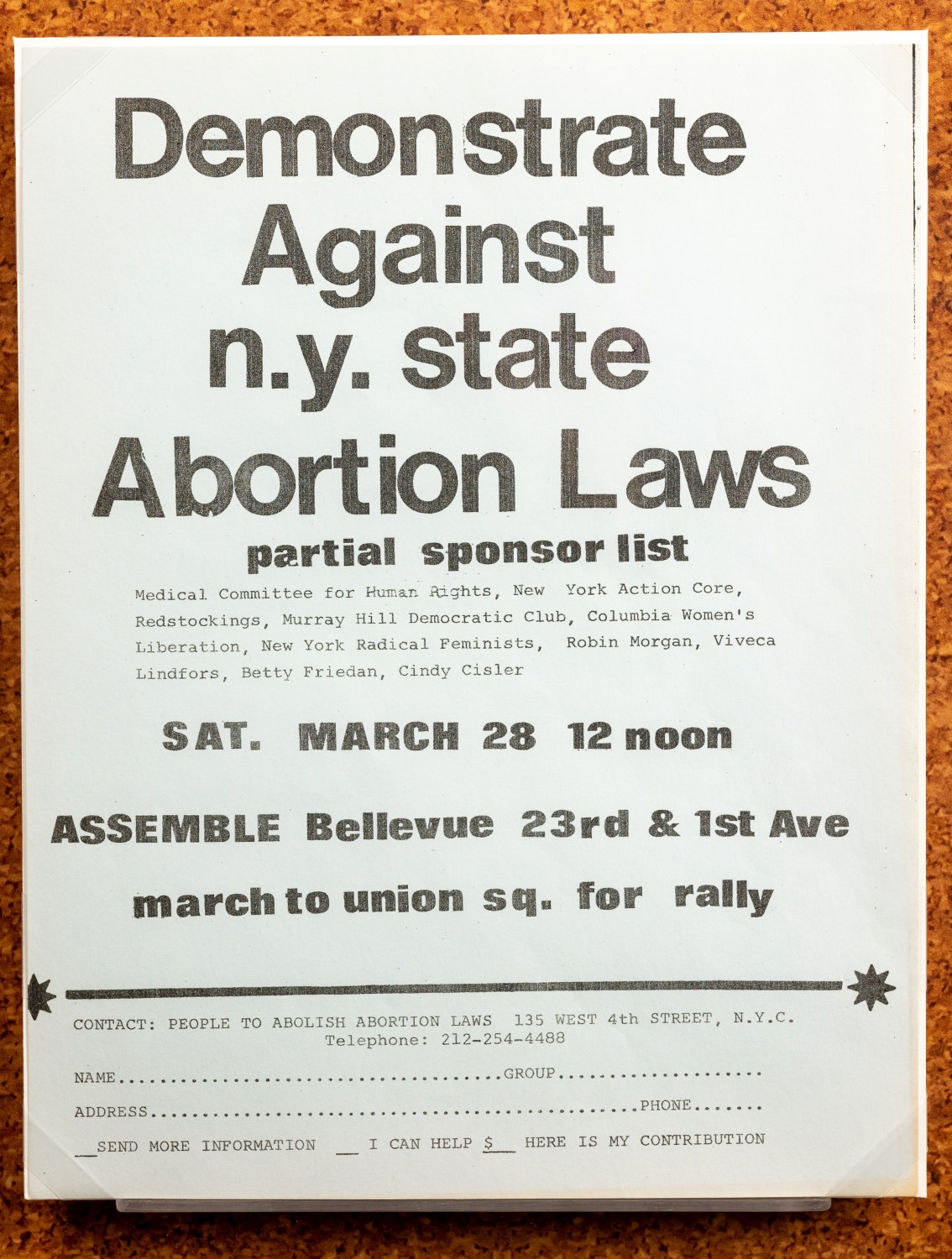
People
to Abolish Abortion Laws
Demonstrate
against N.Y. State Abortion Laws broadside, 1970
Patricia
D. Klingenstein Library, New-York Historical Society
Prior to the Roe
v. Wade decision, New York State was one of eleven states that allowed
doctors to perform abortions under certain circumstances. Feminists argued that
abortion was not truly accessible if it was only available at the discretion of
the medical establishment. They demanded the immediate repeal of all laws
restricting abortion.
Breaking the Silence About
Male Violence
For many women, “the personal is political” slogan applied to domestic abuse. In January 1971, thirty New York women publicly testified about the wide array of bodily violations they had experienced, from street harassment to rape. They rejected the notion that violence was a normal part of sex, and redefined rape as an act of control deployed by men to intimidate women. In 1972, feminists in Washington, DC, and Berkeley, California organized the first rape crisis centers. By 1980, 500 centers existed nationwide. Battered women’s shelters opened to provide refuge to those who escaped abusive partners, and pressured law enforcement to take women’s accusations seriously. Staff counseled rape survivors and encouraged women to overcome passivity and physically resist attackers. Feminists embraced the self-defense of women of color, who were statistically most likely to be victimized by rape and abuse. Between 1974 and 1979, they rallied in support of Inez García, Joan Little, and Yvonne Wanrow, all women of color who had been arrested and incarcerated for killing rapists.
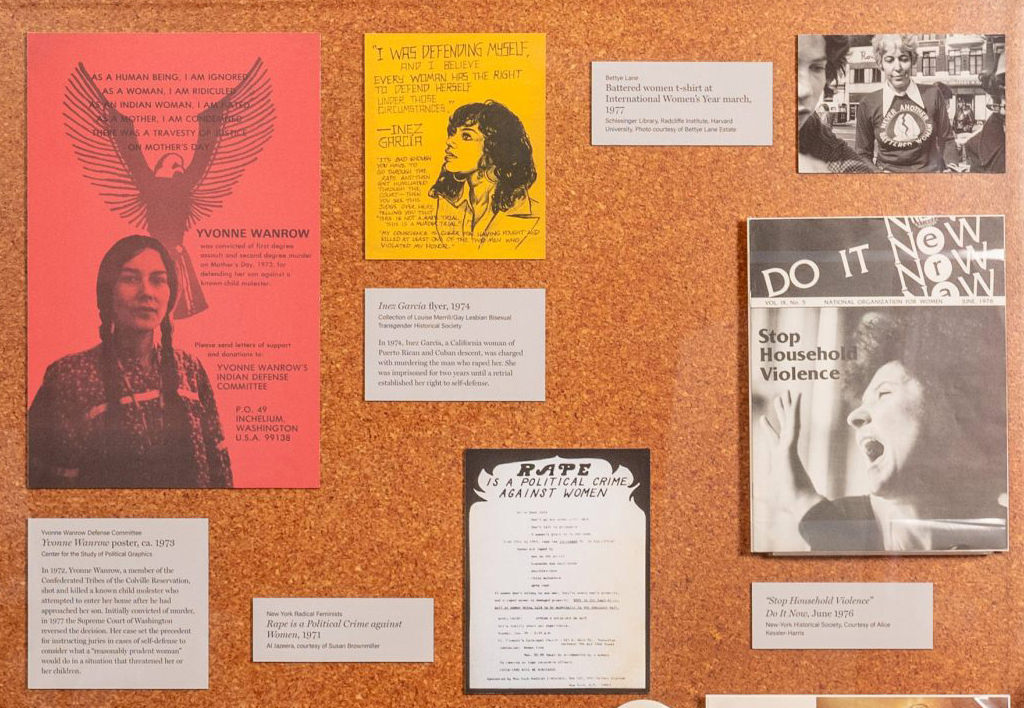
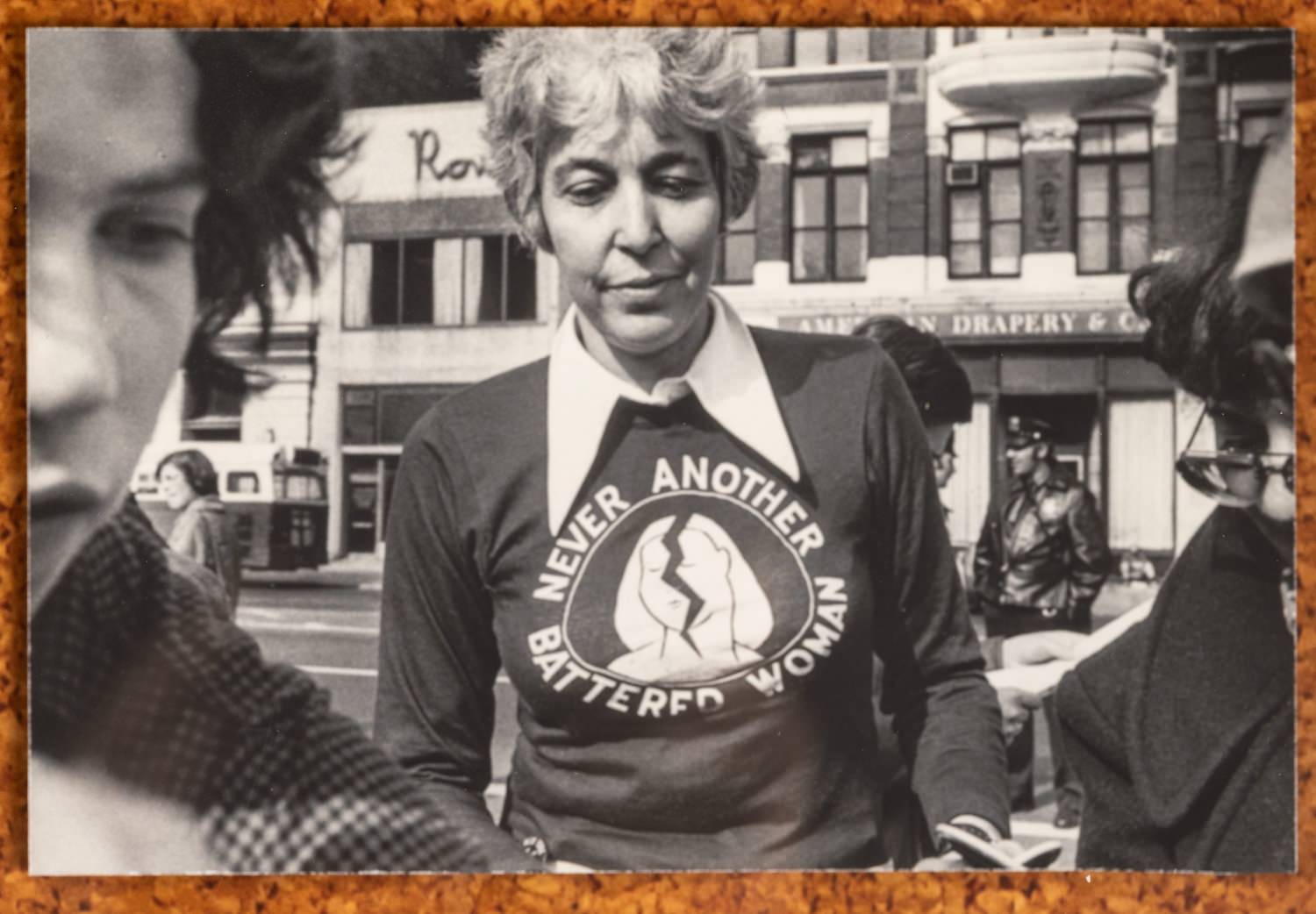
Bettye
Lane
Battered women t-shirt at International
Women's Year march,1977
Schlesinger
Library, Radcliffe Institute, Harvard University, Photo courtesy of Bettye Lane
Estate
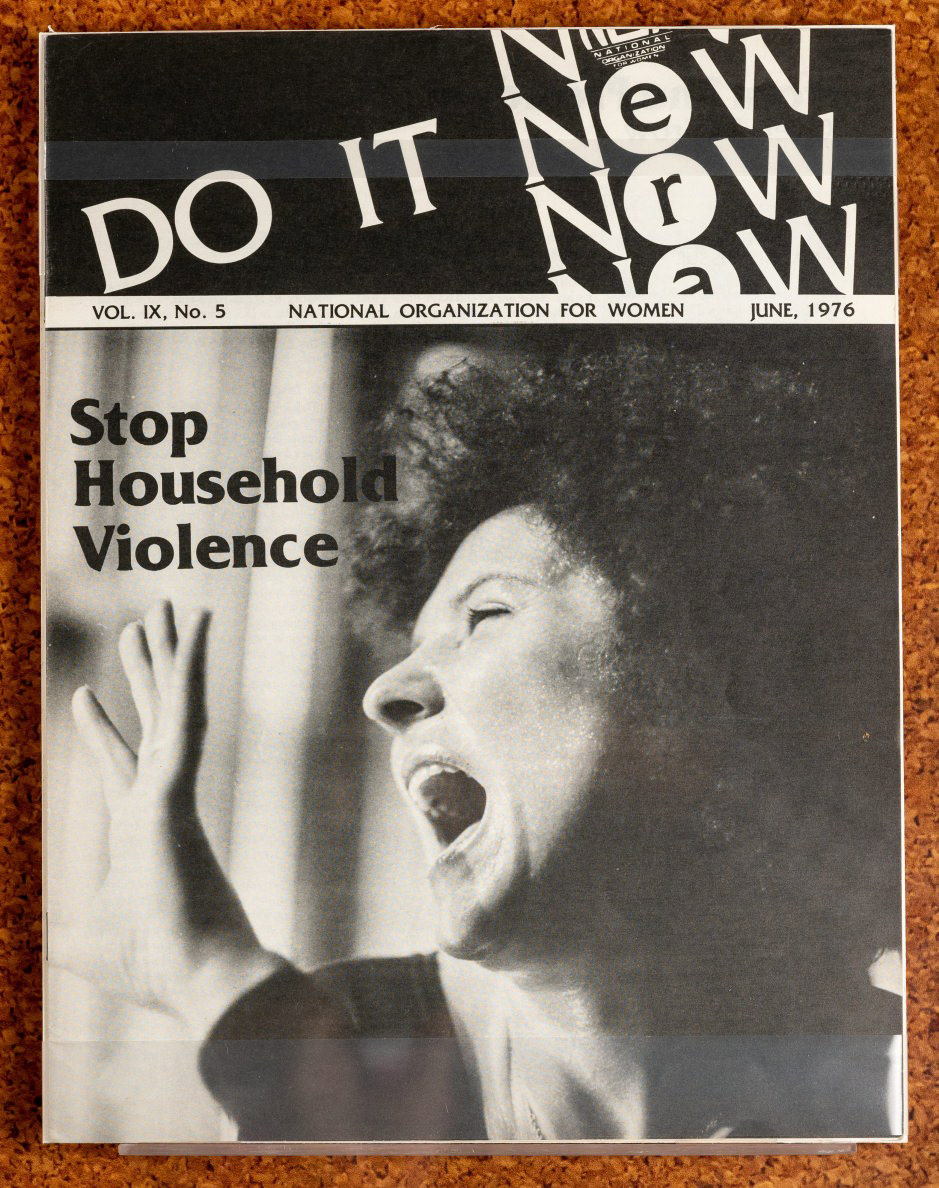
“Stop
Household Violence”
Do It Now, June 1976
New-York
Historical Society, Courtesy of Alice Kessler-Harris
Yvonne
Wanrow Defense Committee
Yvonne
Wanrow poster, ca. 1973
Collection
of Center for the Study of Political Graphics
In 1972, Yvonne Wanrow, a member of the Confederated
Tribes of the Colville Reservation, shot and killed a known child molester who
attempted to enter her home after he had approached her son. Initially
convicted of murder, in 1977 the Supreme Court of Washington reversed the
decision. Her case set the precedent for instructing juries in cases of
self-defense to consider what a “reasonably prudent woman” would do in a situation
that threatened her or her children.
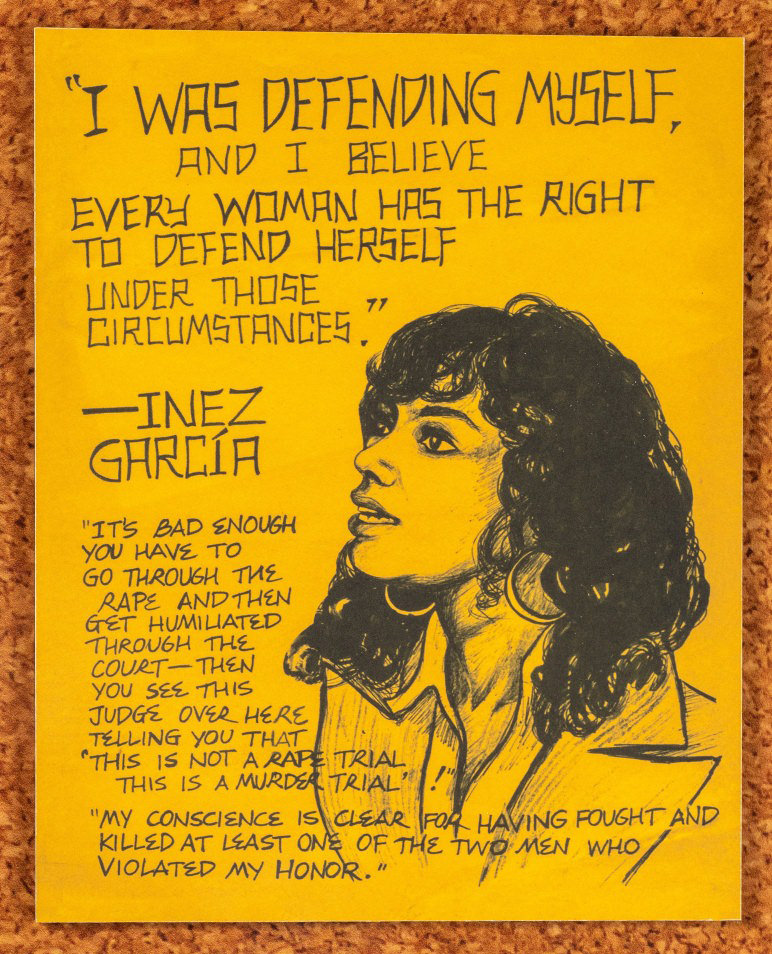
Inez
García
flyer,1974
Collection
of Louise Merrill/Gay Lesbian Bisexual Transgender Historical Society
In 1974, Inez García,
a California woman of Puerto Rican and Cuban descent, was charged with
murdering the man who raped her. She was imprisoned for two years until a
retrial established her right to self-defense.
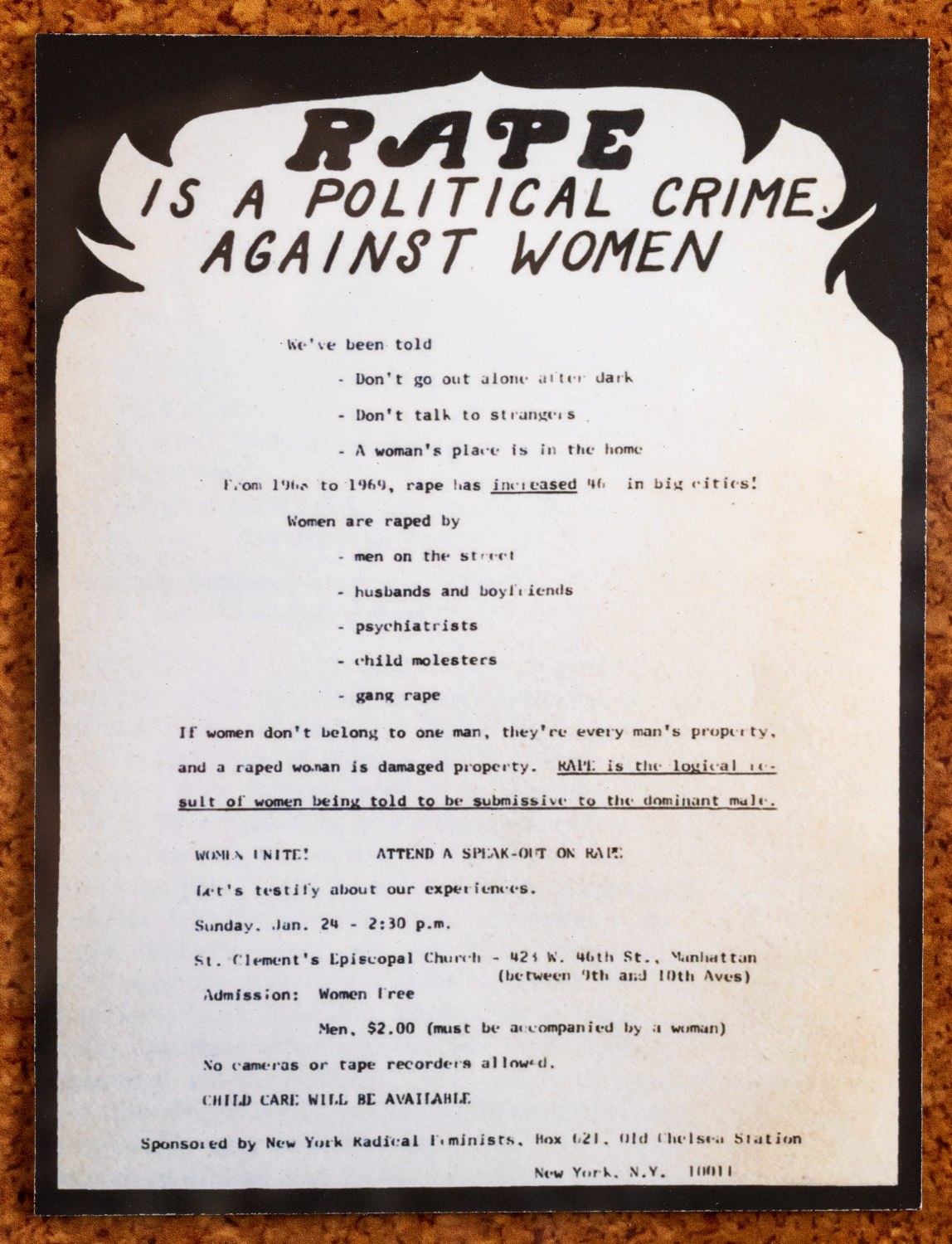
New York Radical Feminists
Rape is a Political Crime against
Women, 1971
Al Jazeera, courtesy of Susan
Brownmiller
Sexual Politics
Women’s liberationists illuminated how the seemingly private world of sexual relations was riddled with power struggles. At the 1968 Miss America pageant, feminists protested the sexual objectification of women with placards featuring advertisements that compared women to prime cuts of meat. Some lesbians in the movement further argued that heterosexuality itself promoted sexism in American culture. The 1969 Stonewall uprising compounded these debates, catalyzing the movement for gay liberation that was rallied in part by transgender women like Sylvia Rivera and Marsha P. Johnson, the founders of Street Transvestite Action Revolutionaries (STAR). In 1970, a group of radical lesbian feminists interrupted the Second Congress to Unite Women in New York City. Their “Lavender Menace” t-shirts challenged Betty Friedan’s remark that lesbians in feminist organizations threatened to discredit the entire movement. They countered that lesbians were actually in the vanguard of the struggle for women’s liberation for not participating in heterosexual culture. Such challenges profoundly shaped the feminist organizations of women of color, such as Boston’s Combahee River Collective and New York City’s Salsa Soul Sisters.
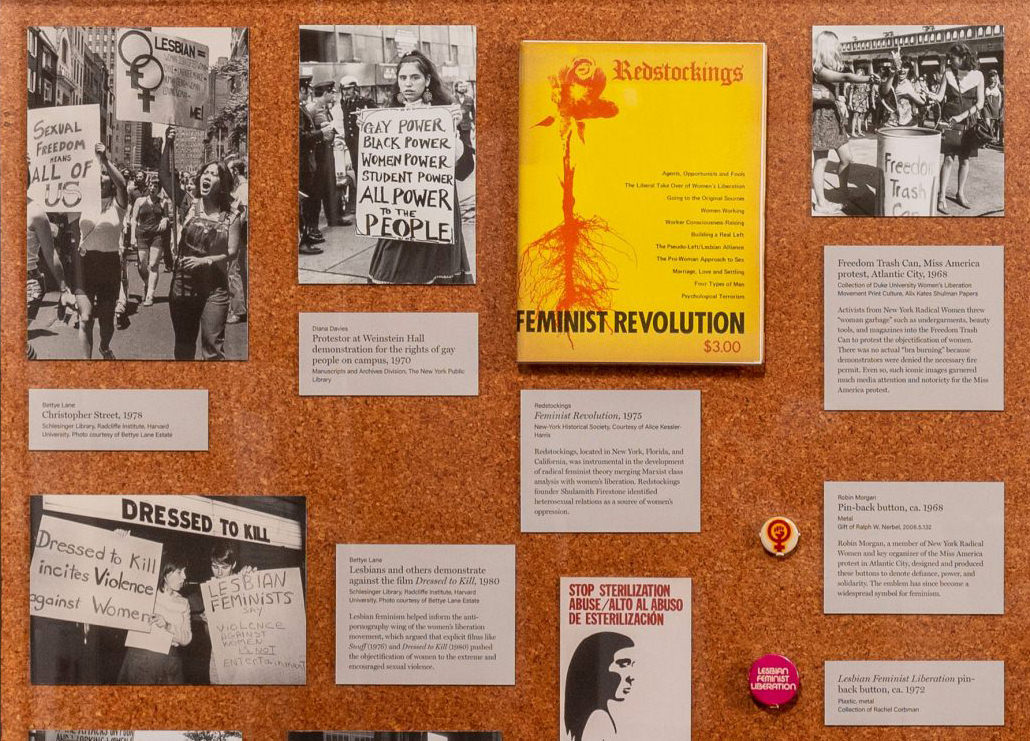
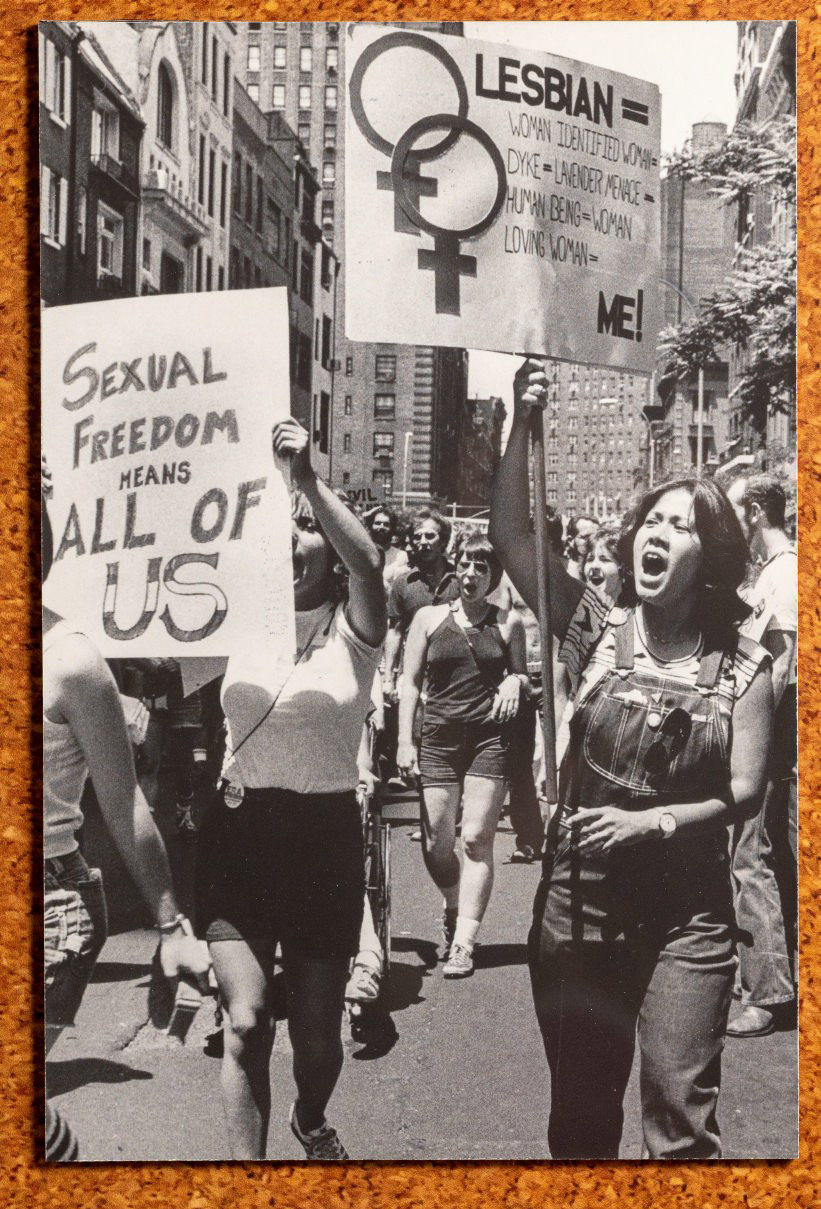
Bettye
Lane
Christopher Street, 1978
Schlesinger
Library, Radcliffe Institute, Harvard University. Photo courtesy of Bettye Lane
Estate
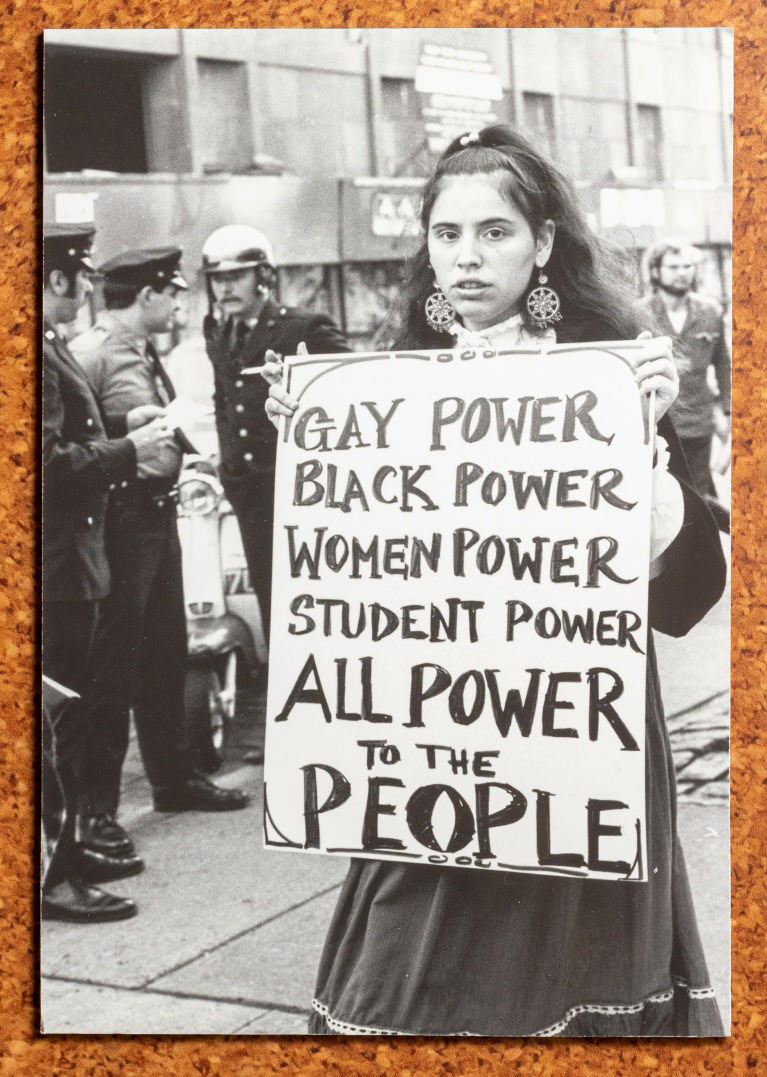
Diana
Davies
Protestor at Weinstein Hall
demonstration for the
rights of gay people on campus, 1970
Manuscripts
and Archives Division, The New York Public Library
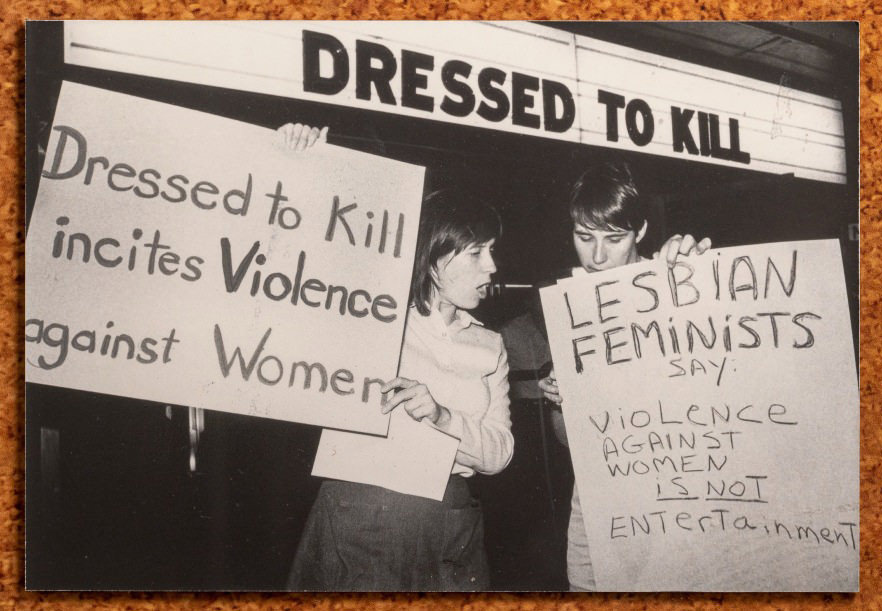
Bettye
Lane
Lesbians and others demonstrate against the film
Dressed to Kill, 1980
Schlesinger Library, Radcliffe Institute, Harvard University, Photo courtesy of Bettye Lane Estate
Lesbian feminism helped inform the anti-pornography wing of the women’s liberation movement,
which argued that explicit films like Snuff (1976) and Dressed to Kill (1980) pushed the objectification
of women to the extreme and encouraged sexual violence.
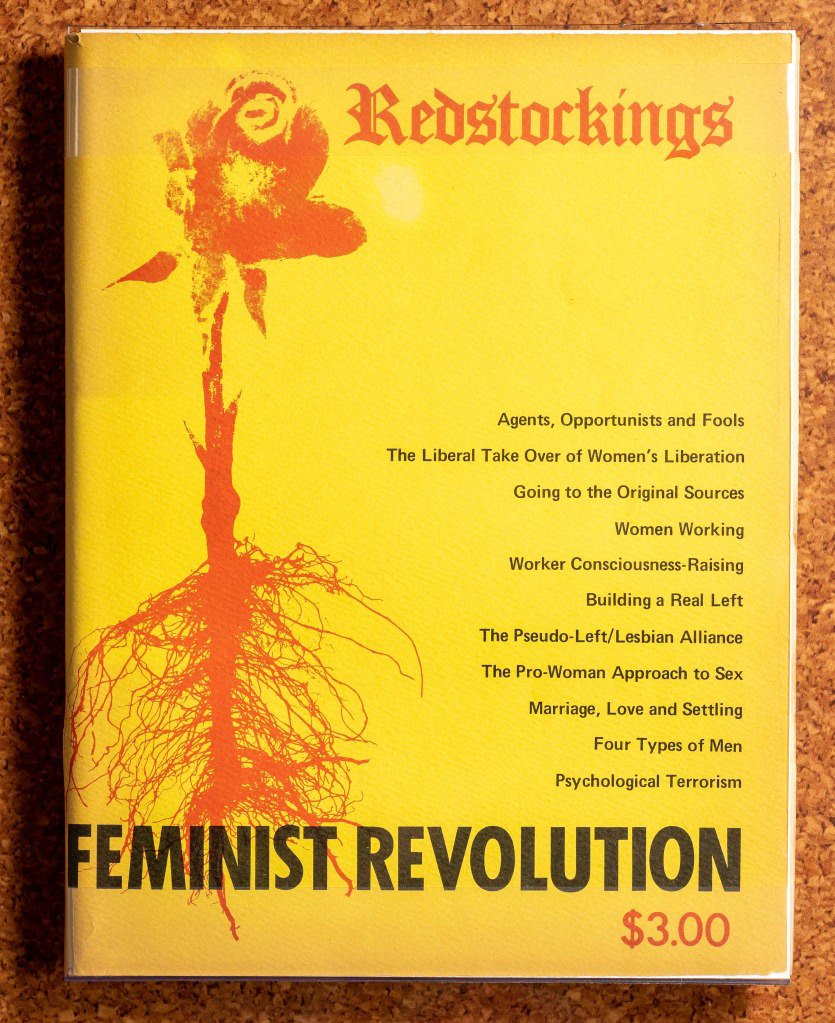
Redstockings
Feminist
Revolution,1975
New-York
Historical Society, Courtesy of Alice Kessler-Harris
Redstockings,
located in New York, Florida, and California, was instrumental in the development
of radical feminist theory merging Marxist class analysis with women’s
liberation. Redstockings founder Shulamith Firestone identified heterosexual
relations as a source of women’s oppression.
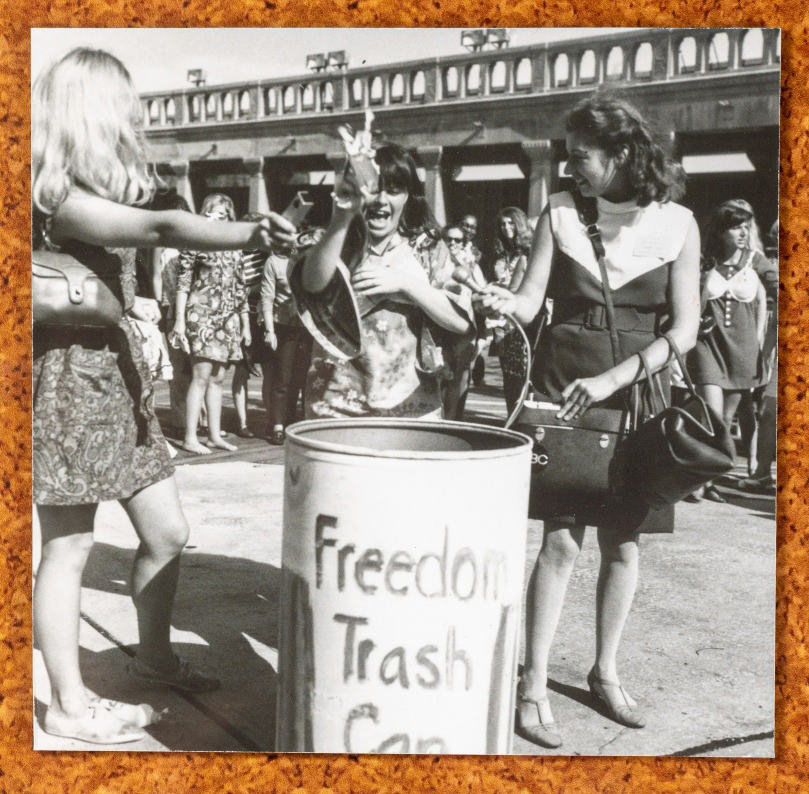
Freedom Trash Can, Miss America protest,
Atlantic City, 1968
Collection
of Duke University Women’s Liberation Movement Print Culture, Alix Kates
Shulman Papers
Activists
from New York Radical Women threw “woman garbage” such as undergarments, beauty
tools, and magazines into the Freedom Trash Can to protest the objectification
of women. There was no actual “bra burning” because demonstrators were denied
the necessary fire permit. Even so, such iconic images garnered much media
attention and notoriety for the Miss America protest.
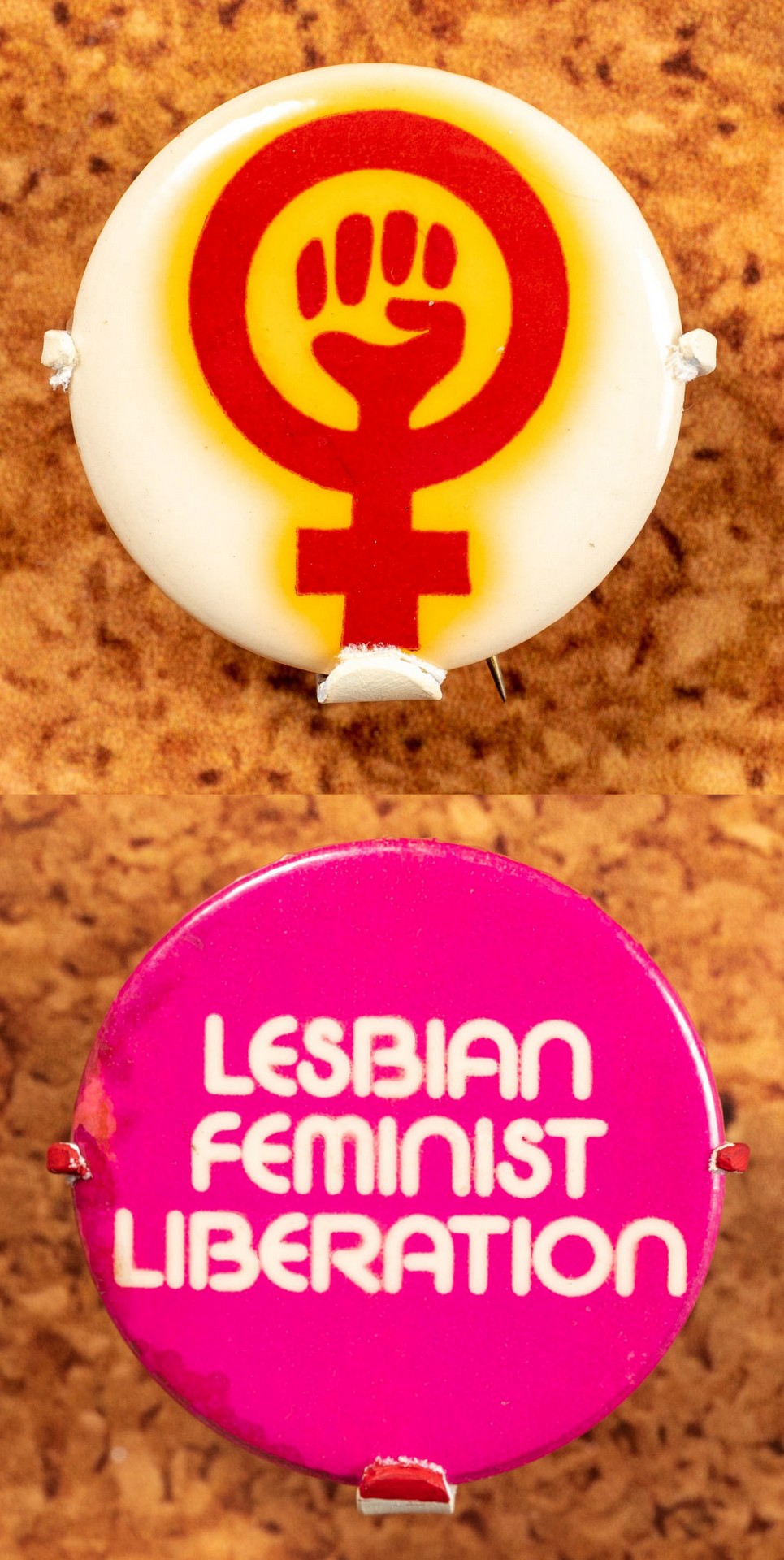
Pin-back button, ca. 1968
Metal
Gift of Ralph W. Nerbel, 2006.5.132
Robin Morgan, a member of New York
Radical Women and key organizer of the Miss America protest in Atlantic City,
designed and produced these buttons to denote defiance, power, and solidarity.
The emblem has since become a widespread symbol for feminism.
Lesbian
Feminist Liberation
pin-back button,ca. 1972
Plastic, metal
Collection
of Rachel Corbman

